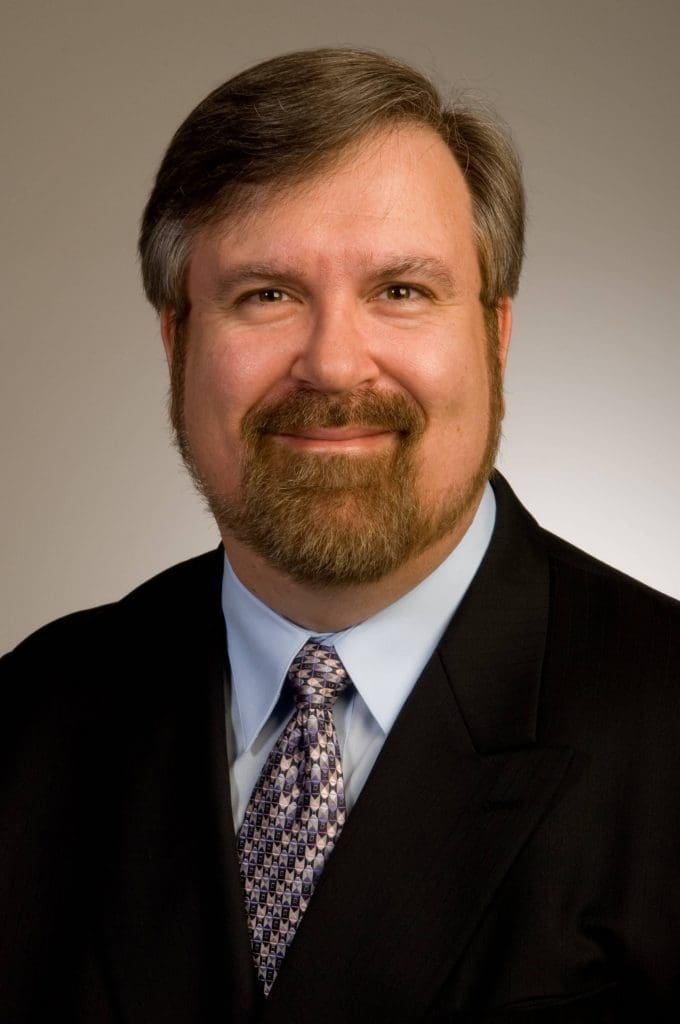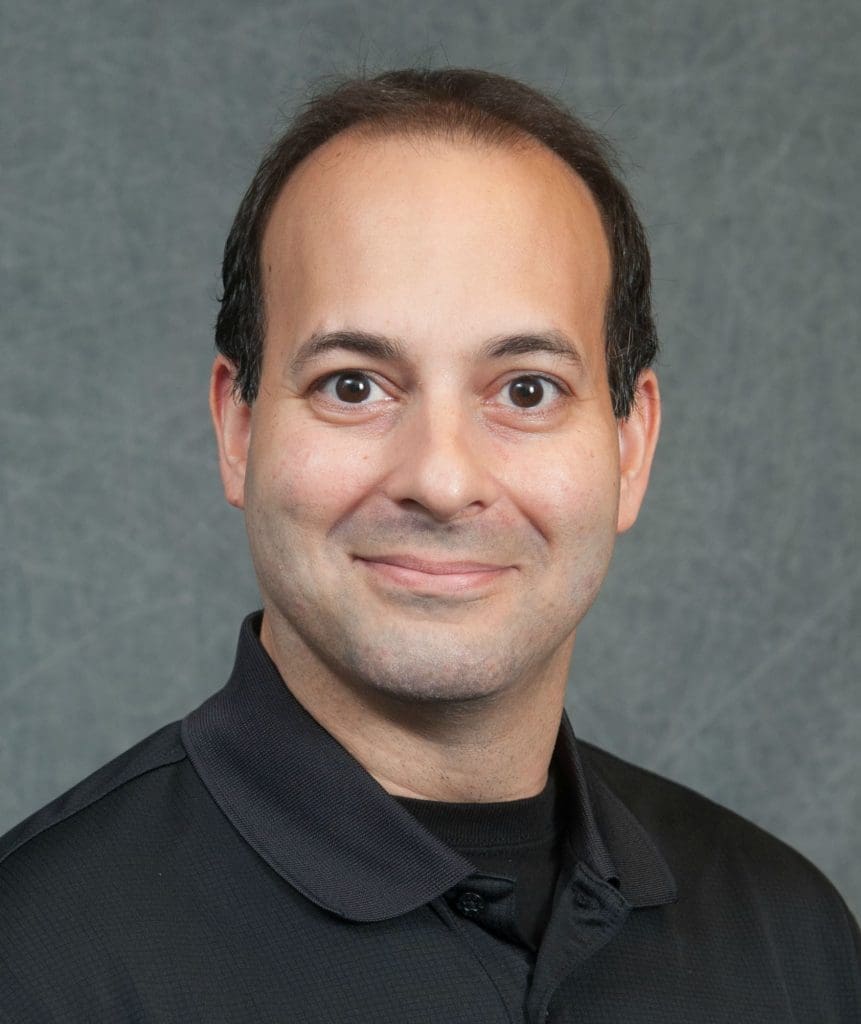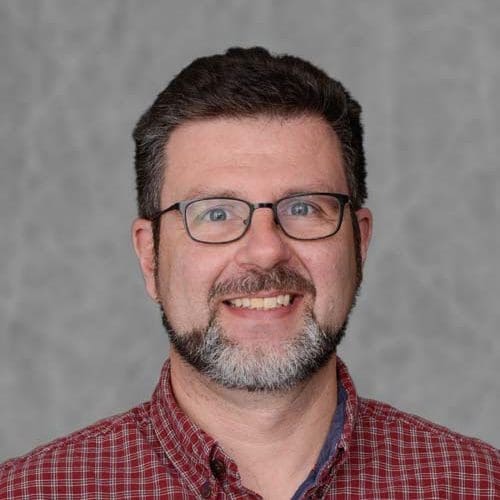Where would NC be without UNC Essential Workers?
The UNC System salutes its dedicated employees after a year of exemplary service during impossible circumstances. Faculty and staff moved 17 campuses to distance instruction, implemented extensive safety protocols, ran rigorous testing programs, and set up accessible vaccine clinics to serve their communities.
These employees are the textbook definition of essential workers, and their work underscores the long-term value of public higher education.
During a time of unprecedented crisis, they showed up for students and they showed up for the state of North Carolina. Here are their stories.
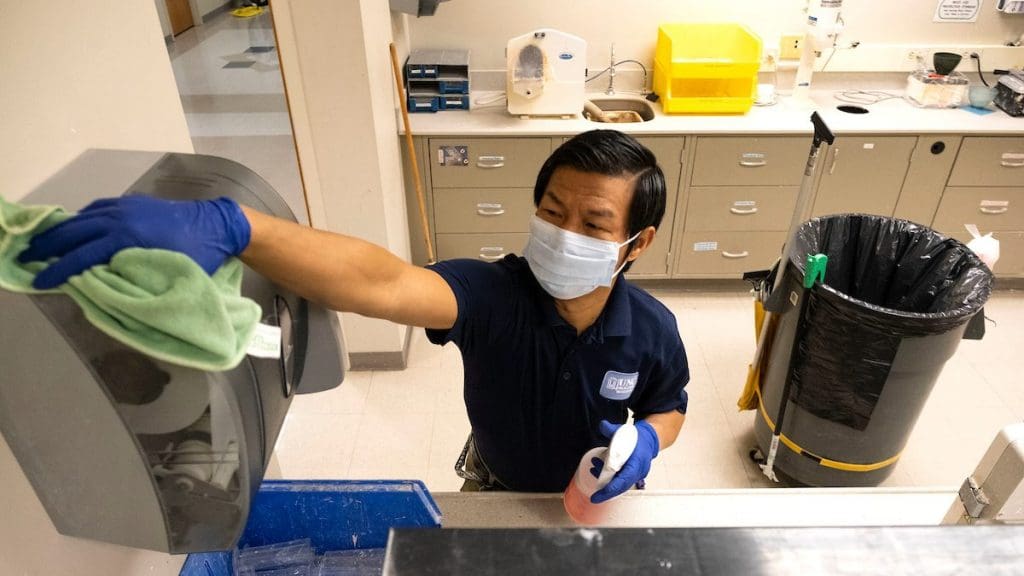
Housekeepers
UNC-Chapel Hill
The third shift Facilities Services housekeepers at UNC-Chapel Hill clean the UNC Adams School of Dentistry overnight so that dentists and hygienists can treat patients at clinics during the day. Faculty and students also use the school to conduct research and cast dental molds.
UNC-Chapel Hill employs a total of 400 housekeepers to care for 245 buildings. Crew leader Phyllis Seymore was part of the skeleton crew that continued to clean in March 2020 when many university employees began to work remotely because of the pandemic.
“We would come in, and we separated, and we each took a building and went to our area, and that’s where we were till it was time to go home. I was using so much disinfectant. We were using a lot because we were scared,” Seymore said.
Now, at the beginning of their shift, the 18 housekeepers on Seymore’s crew report to the supply room in the basement of Tarrson Hall, one of four buildings they clean at the school, to pick up a packet of supplies for the day’s assignments. What’s been different about the supplies during the pandemic is that all the specialized cleaners — like solutions for glass or stainless steel — have been replaced by two germicidal cleaners that are used to sanitize toilets, mop floors and disinfect all high-touch surfaces.
“Everybody is afraid of COVID, but we are going to get the job done anyway.” said Myo Tun, assistant director of housekeeping services.
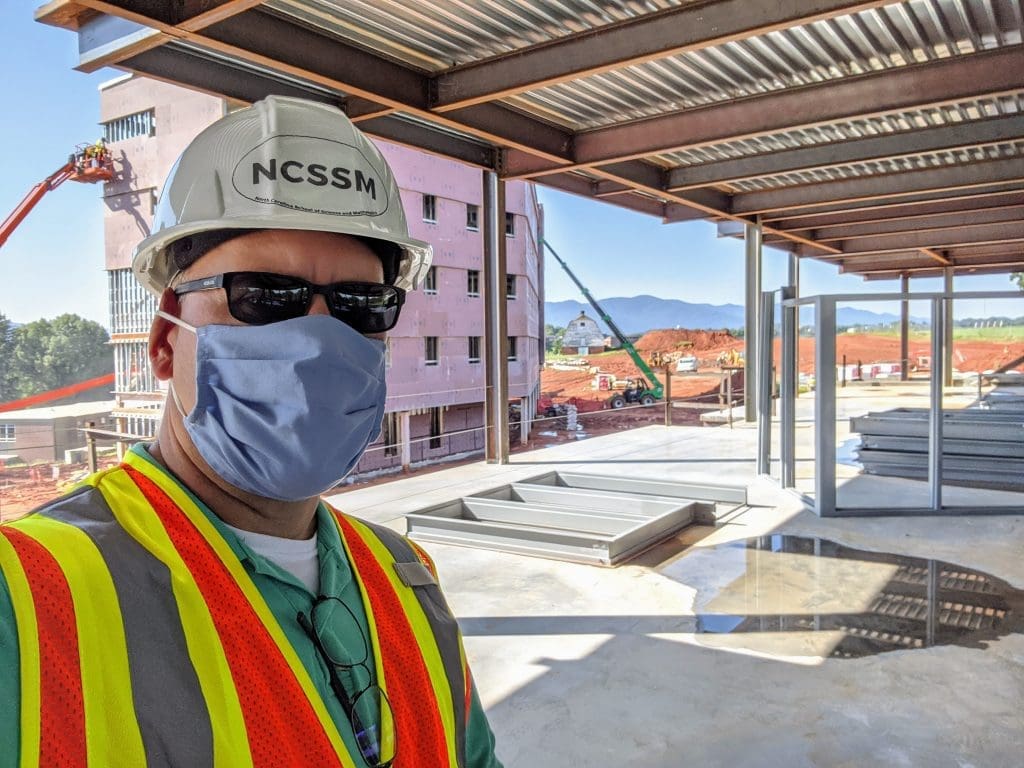
Kevin Baxter
North Carolina School of Science and Mathematics
Kevin Baxter is undeterred. In spite of a pandemic, the vice chancellor and chief campus officer for NCSSM-Morganton has pushed forward relentlessly to achieve on-time completion of a second residential campus for the North Carolina School of Science and Mathematics. NCSSM, founded in 1980, is the nation’s first public residential high school specializing in science, technology, engineering, and math. It is the only standalone high school among the 17 campuses of the UNC System and will be the first program of its kind anywhere with two physical locations.
For nearly five years, Baxter has been setting the table for even more academically talented high school students from across the state to enroll in a life-changing opportunity at the state-of-the-art campus in Morganton. Baxter has spearheaded the project from its conceptual phase, carefully shepherding the construction timeline, community engagement, steering teams and fundraising efforts. In spite of it all, the campus is still mapping to the target of completing construction this summer and enrolling its first residential class in August 2022.
Baxter recently narrated a drone tour of the new western North Carolina campus where students will explore data science throughout the curriculum, learning to use data in an ethical way to design useful solutions to today’s challenges. “The past year has really underscored the need for us to educate leaders who will solve real-world problems,” said Baxter. “There couldn’t be a better time for NCSSM to double down on its promise of a transformative educational experience for North Carolina’s brightest students.”
There couldn’t be a better time for NCSSM to double down on its promise of a transformative educational experience for North Carolina’s brightest students.
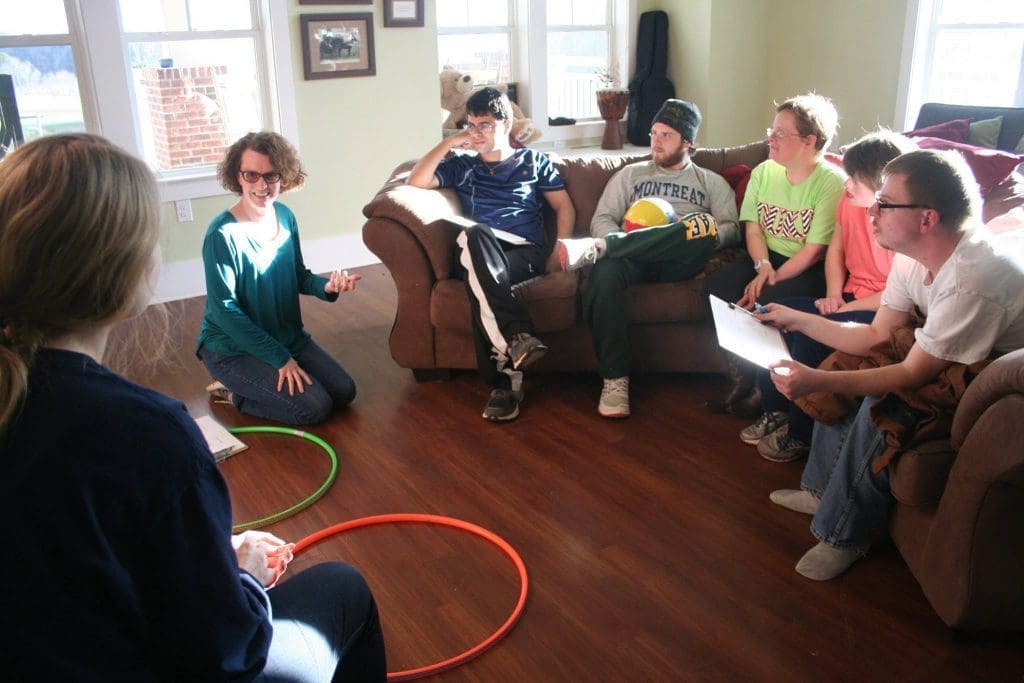
Kim Cuny
UNC Greensboro
Kim Cuny, a communication studies professor and director of the UNC Greensboro Speaking Center, embraces the motto “to serve” in developing a strong partnership with the 89-acre Peacehaven Community Farm in Whitsett. For the past five years, Cuny and her students have been helping residents with intellectual and developmental disabilities improve their communication skills.
Every Friday until the pandemic hit, Cuny and a group of Speaking Center students would drive to the farm and teach the primary residents new communication competencies. Their lessons focused on skills such as respecting personal space, asking open-ended questions, and public speaking. They even started a weekly program at UNCG called “Let’s Communicate,” open to all adults in the community with intellectual or developmental disabilities who want help with communication. The team’s work continues virtually for now, and in recognition, Cuny was awarded the 2020 Service Engagement Award from the National Communication Association.
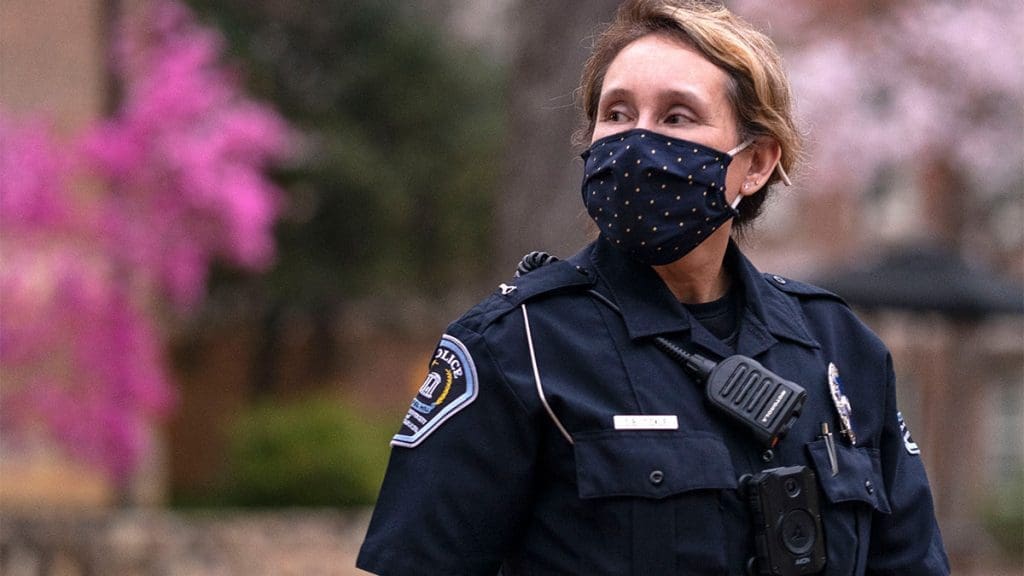
Charlin Bolin Tickle
UNC-Chapel Hill
During the last year, while many UNC-Chapel Hill employees worked from home via Zoom, Charlin Bolin Tickle amassed more than 1,300 hours of campus security patrols. Much of that time is spent on foot at night — or the early morning hours — which is how she likes it.
Tickle is one of 60 UNC Police officers who show up for work to protect and serve the campus community. Last March, after the campus shifted to remote operations, the UNC Police had to adapt. Except for staff meetings and trainings, most police work needs to be done in-person.
A 47-year-old mother of three, Tickle thrives on the personal interaction.
“It was very weird walking into the department and not seeing a soul,” she said of coming to campus last spring. “That’s our hub of activity. That’s where we catch up. It sounds like a cliché, but I see these people more than I see my family. They are my family. I joke that I have eight of the best big brothers in the world, because I do.”
Tickle has public service in her DNA. A graduate of Virginia Commonwealth University, she was a police officer in Virginia before retiring in 2008 due to an injury. After that she worked for the Alamance County Board of Elections, but then a domestic incident in the building’s parking lot inspired a return to police work.
For the second time, Tickle entered the police academy, the oldest candidate in her class. She was considering a job on the Winston-Salem police force but said UNC Police is a better fit.
“There are 60 of us in the department, and I can pretty much tell you everybody’s name and their face. Everybody says that with the police, fire and EMS, you’re a family. This place truly embodies that.”
Everybody says that with the police, fire and EMS, you’re a family. This place truly embodies that.

Rickey Freeman
Elizabeth City State University
Rickey Freeman, Elizabeth City State University’s emergency management director, has a passion for his work.
Emergency management has been his blood since he worked in the Bertie County Emergency Operations Center in the aftermath of Hurricane Floyd.
For 10 years, he was the emergency management coordinator in Bertie County. He’s now been at ECSU 10 years and may have just seen the biggest test of his career with COVID-19.
“The unknown has been a challenge because things are changing all of the time,” he said. “But the campus community has pulled their share and it has all gone well.”
Working with Student Health, Freeman implemented campus-wide social distancing measures throughout the buildings, procured personal protective equipment, and coordinated signage and safety information for students, faculty, and staff. His efforts paid off. ECSU did not shut down campus for a COVID-19 outbreak, and infection numbers remained low.
“But I wasn’t a one-man show,” he added. “Everybody contributed.”
Now, as a new hurricane season approaches, Freeman will also keep his eye on the weather, prepared to coordinate potential storm response plans for the campus. And as a longtime elected member of the Bertie County Board of Education, he will continue his dedication to community service.
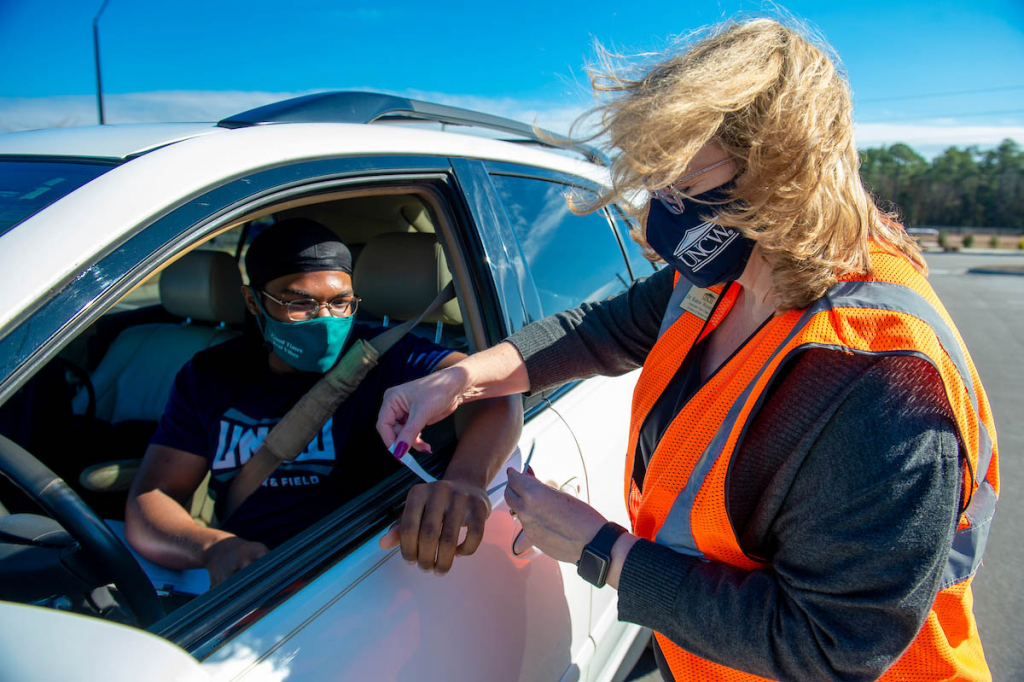
Katrin Wesner-Harts
UNC Wilmington
Katrin Wesner-Harts is leading the University of North Carolina Wilmington toward COVID-19 recovery.
The interim associate vice chancellor for student affairs, Wesner-Harts oversees the university’s vaccination clinic, which has opened to serve the UNC Wilmington campus community.
The 2019-20 president of the American College Health Association, Wesner-Harts is UNCW’s go-to expert on all things COVID-19, remaining hard at work since the beginning of the pandemic. She drafts health and safety protocols. She manages testing and quarantine programs. She sends out daily COVID-19 reports to campus leadership.
But her work isn’t just administrative. It’s also personal.
When students are in quarantine, Wesner-Harts visits them. She brings them blankets, ensures they’re getting proper meals, and helps them maintain comfort in isolation. When students are concerned about their health or have questions about other issues related to COVID-19, Wesner-Harts takes their phone calls and meets with them on Zoom. She also spends time personally responding to countless emails from concerned parents, faculty and staff.
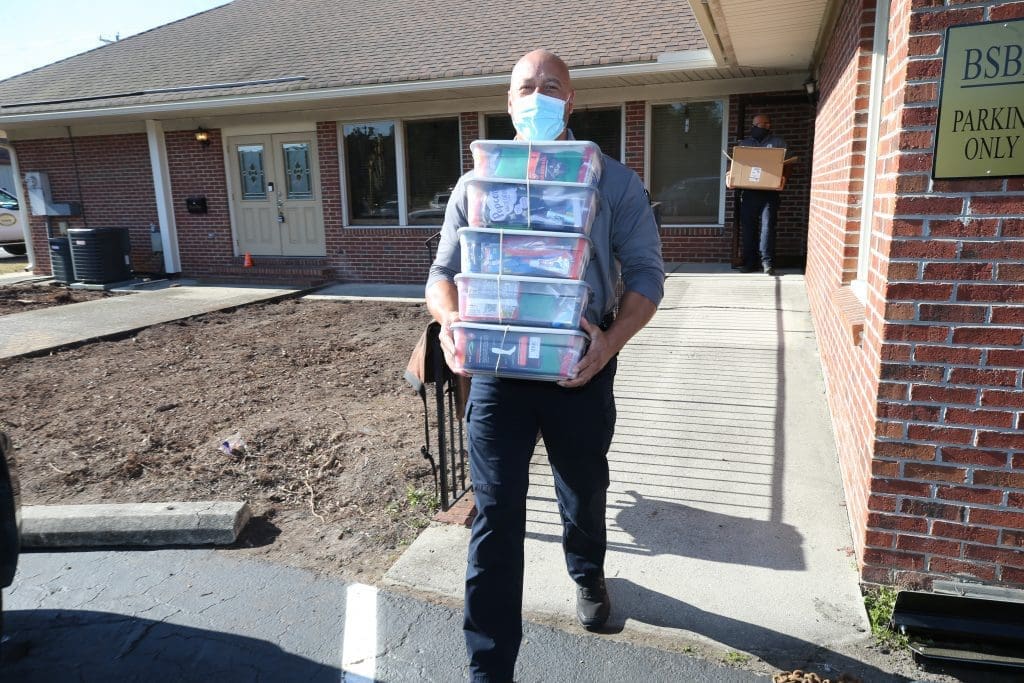
Stephen Brooks
UNC Pembroke
The yearlong pandemic has robbed Stephen Brooks of the most rewarding and meaningful aspects of his role as a campus police officer at UNC Pembroke. Student engagement.
Coronavirus has forced Brooks to engage students at a distance — something he has yet to get used to. Brooks has spent the last 20 years cultivating relationships with UNCP students. Despite having to suspend high fives and keep his distance, Brooks has kept watch over his hometown university. He goes above and beyond routine campus patrols.
Over holiday break, Brooks and his fellow officers delivered holiday care packages to dozens of students who could not return home. Students in quarantine on campus have received personal visits and meals from Brooks, who is sure to offer words of encouragement.
Officer Brooks is doing his part, educating students on COVID-19 health concerns and how to stay healthy. He’s also stressing the importance of abiding by university health and safety guidelines, especially as it relates to large gatherings. Since the beginning of the pandemic, Brooks has taken an active role in emergency planning and recovery operations for COVID-19. With years of crisis management experience, he understands the importance of a proactive approach.
As UNCP continues to navigate through these difficult times, Brooks and other first responders on campus remain vigilant. That’s the only way to bring him closer to what he loves most about UNCP. The students.
“That’s the one thing that drives me.”
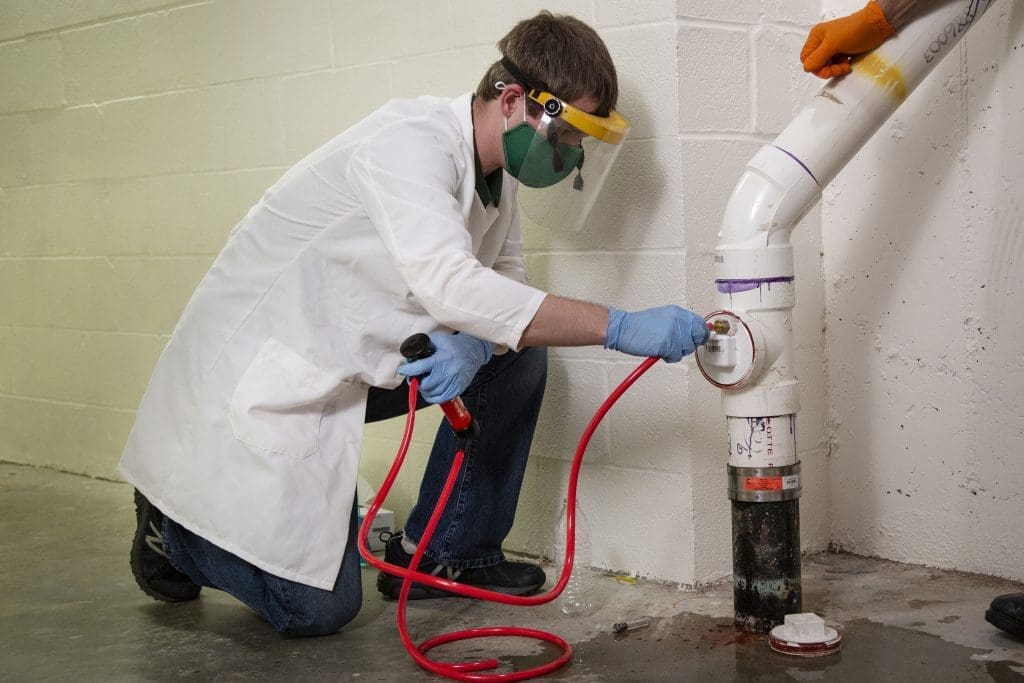
Kevin Lambirth
UNC Charlotte
Kevin Lambirth is helping prevent COVID-19 outbreaks on UNC Charlotte’s campus.
As a bioinformatician and researcher in the College of Computing and Informatics at UNC Charlotte, Lambirth collects wastewater samples as part of the university’s efforts to mitigate COVID-19.
Lambirth, who earned his Ph.D. from UNC Charlotte, has provided energetic and ongoing support for this campus-wide project, working on installation of autosamplers and collecting wastewater samples for daily testing. He works with a comprehensive team of researchers from the College of Computing and Informatics and The W.S. Lee College of Engineering.
“The COVID-19 campus monitoring effort has been incredibly successful in reducing the number of active and contagious cases at UNC Charlotte,” said Lambirth. “We’ve kept infection to a minimum and pushed us closer toward the goal of full operations. Being part of a team that’s keeping our community safe is beyond anything I imagined. Getting people back to their friends and family is well worth the effort.”
Being part of a team that’s keeping our community safe is beyond anything I imagined.
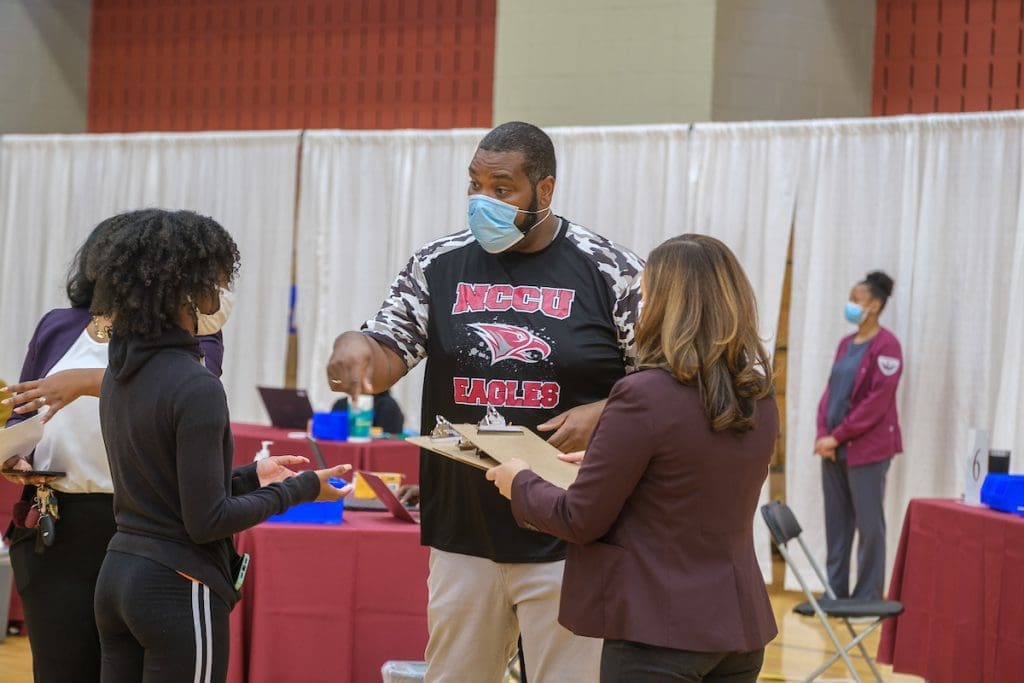
Derrick Garrett
NC Central University
The impact of the COVID-19 pandemic has required faculty and staff at North Carolina Central University to manage and juggle even more than they regularly do.
The pivot prompted Derrick Garrett’s switch from student activities manager to a role more focused on the university’s immediate and growing COVID-19 needs. Garrett has successfully managed quarantine and isolation operations and logistics.
When NCCU students living on campus are notified that they’ve tested positive for COVID-19, or that they may have been exposed to someone who tested positive, things move quickly. During the past seven months, Garrett has worked to make those sudden relocations as smooth as possible. He also cares for students who are in quarantine or isolation.
Each day, Garrett provides students with emergency transportation, meal delivery and special accommodations. He also processes student requests for essential items and is instrumental in bridging the gap for instruction to help students stay on track with their coursework. He provides logistical needs and troubleshoots operational issues.
Garrett finds joy in his service to NCCU.
“I believe that you must maintain a good connection with people,” Garrett said. “Being able to assist students during a vulnerable moment is an opportunity I don’t take lightly.”
As a graduate student in NCCU’s Higher Education Administration Program, Garrett aspires to a position as a student affairs professional in higher education.
Being able to assist students during a vulnerable moment is an opportunity I don’t take lightly.
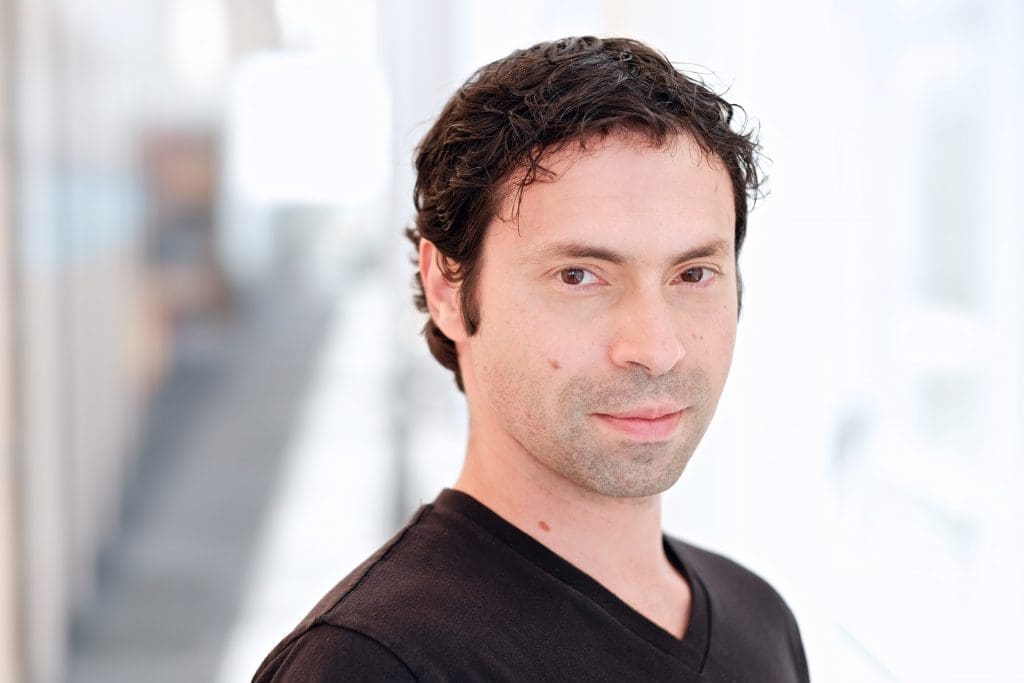
Ilya Kozadayev
UNC School of the Arts
How do you move a beloved ballet from the stage to the sound stage?
“Nutcracker” choreographer and UNCSA ballet faculty member Ilya Kozadayev faced a creative challenge when setting new choreography for a filmed production during COVID-19.
First, the production was scaled down from over two hours to 30 minutes.
“That required really sitting down and thinking through which scenes needed to be shortened, what scenes needed to be completely omitted and how we could create a throughline and not lose the essence of the story,” said Kozadayev.
Having created choreography for film before, Kozadayev collaborated with the School of Filmmaking to identify shots and align them with dancers’ movements. While keeping COVID-19 safety protocols top of mind, they together found a way to safely bring dancers to the stage.
“We’re in a unique place on this campus to have the opportunity to collaborate with so many amazing artists to put this together,” said Kozadayev.
The cinematic production of “The Nutcracker” premiered in December 2020. Classical Voice North Carolina hailed the all-new film, writing that it “demonstrated the inventive spirit and exceptional artistry characteristic of North Carolina’s top-ranked public arts conservatory.”
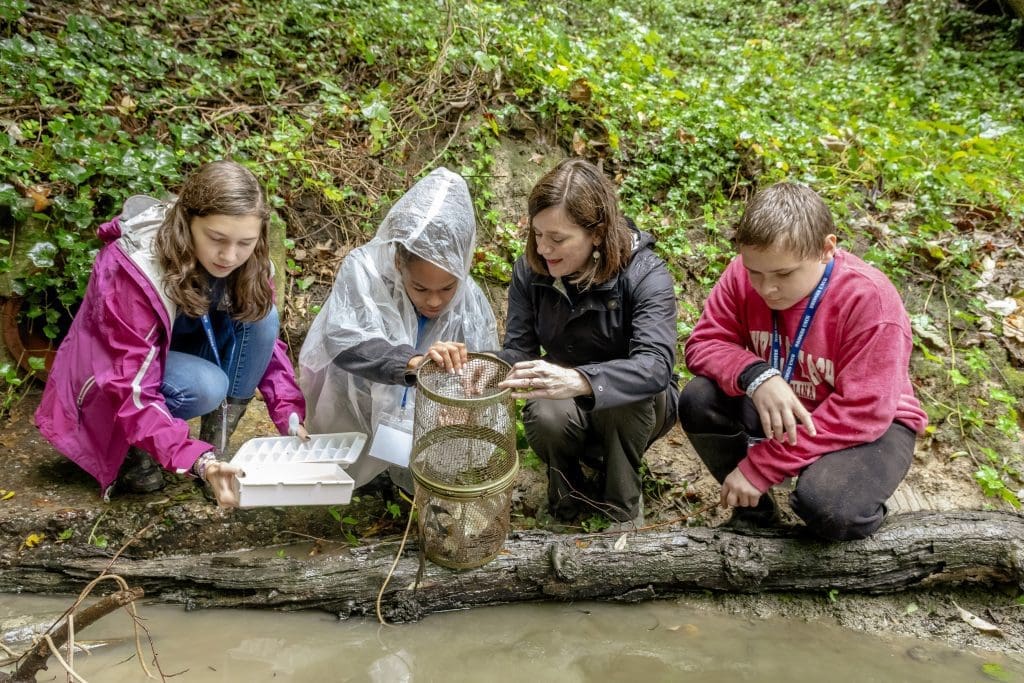
Heidi Carlone
UNC Greensboro
Heidi Carlone loves science. A professor in the UNC Greensboro School of Education, Carlone is helping mold the next generation of teachers, preparing them to address socioeconomic differences in their students.
Carlone is the first recipient of the Jennifer Smith Hooks ’76 and Jacob T. Hooks Distinguished Professorship in STEM Education. The professorship is a key component of the School of Education’s vision to provide transformative educational experiences, advance research and innovation, and bridge research and practice. Her impact on the community is clear – she makes science and engineering pathways more accessible and equitable for historically underserved and underrepresented populations in K-12 youth who have wide-ranging life experiences, ethnicities, socioeconomic backgrounds, and interests.
Carlone is a mentor and role model for future STEM public schoolteachers in the School of Education. In addition to a summer camp experience for Girls in STEM, Carlone leads an immersive program for elementary school teachers from across the state, teaching them how to integrate STEM into the classroom.
“In classes where we have teachers doing outstanding things, using best practices, we are seeing students actively engaged in learning,” Carlone said. “It’s really exciting. When teachers are using the best tools to teach, we are preparing them, and by extension, the next generation, to actively participate in their communities.”
A teacher-scholar, Carlone publishes and presents her work in national and international venues and has earned over $3.8 million in funding from local and national foundations. She has received a number of awards in her academic career including: the Early Career Development Award (CAREER) from the National Science Foundation, Sallie Mae First Year Teacher of the Year in Wake County Schools, and North Carolina Teaching Fellow, among others.
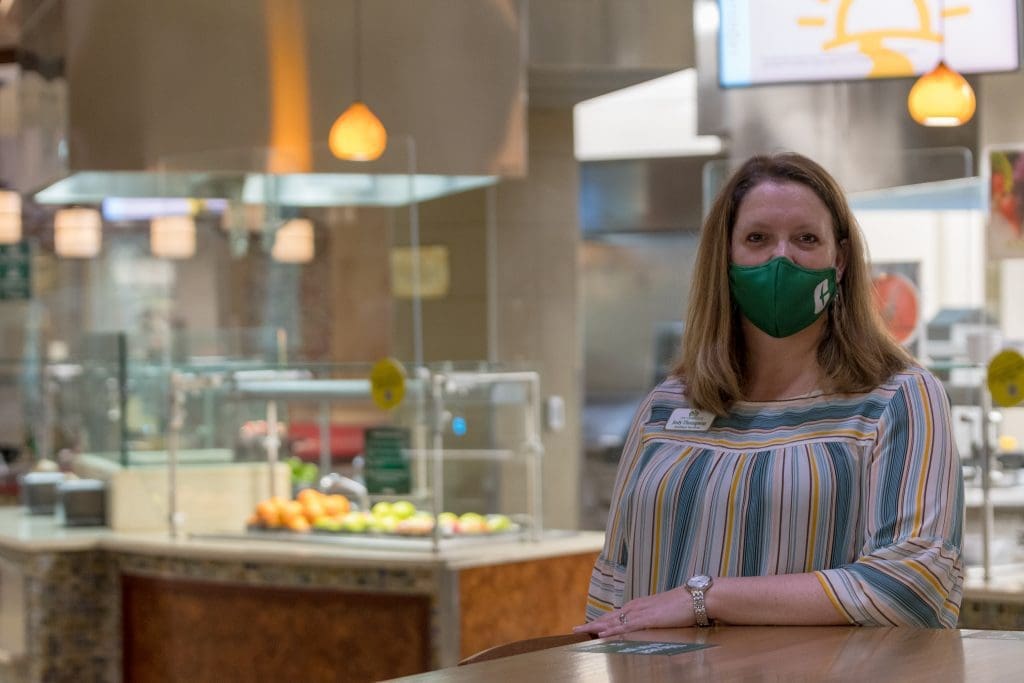
Jody Thompson
UNC Charlotte
Jody Thompson, interim director of auxiliary services at UNC Charlotte, knows that food has the ability to comfort and build community. It’s why she’s spent the past seven years supporting university dining services, implementing changes that better serve students and employees.
Thompson, who is always eager to lend a hand, knew she could offer comfort to students during this time of uncertainty. She, alongside UNC Charlotte’s dining partner, built and executed a quarantine/isolation meal program that provides students with three full meals every day they are in isolation due to COVID-19 exposure. Thompson also assisted in the launch of a mobile ordering app, reducing face-to-face transactions. She physically reorganized dining halls to ensure social distancing and continues to serve as the go-to dining contact for all students and families. Even in moments of stress, Thompson gives her full attention to their concerns and provides cogent and empathetic responses.
“In auxiliary services, we are lucky to work in a customer service-driven environment, and the campus community is our guest,” Thompson said. “My goal is to make sure that these guests have the best experience possible when interacting with our areas.”
In auxiliary services, we are lucky to work in a customer service-driven environment, and the campus community is our guest.

Shengmin Sang
N.C. A&T State University
Shengmin Sang, research professor in NC A&T’s College of Agriculture and Environmental Sciences, is conducting research into whether ginger could help asthma patients.
He and his colleagues at Columbia University were awarded a $1.8 million grant from the National Institutes of Health to investigate whether a component of ginger extract, called 6-shogaol, can relax the smooth muscles found in the human airway. During an asthma attack, smooth muscles contract, constricting a patient’s airway.
Sang’s team will look at whether the pungent spice could eventually be an effective treatment for asthmatics. Ginger is a well-known folk medicine, but its medicinal uses are becoming better understood in the lab. This is the second grant awarded to Sang and his colleagues to study ginger and asthma.
Based at the North Carolina Research Campus in Kannapolis, Sang works to purify and identify bioactive components from foods and herbal medicine to study their preventive effects on cancer and metabolic syndrome.
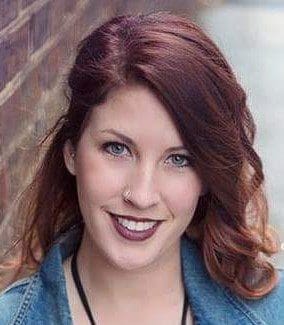
Bethany Meighen and Lydia Mayer
UNC System Office
When the pandemic eliminated the opportunity for many prospective students to visit the University of North Carolina System’s 16 campuses to make their college choice, recruiters had to pivot quickly. UNC System student affairs staff, led by Vice President Bethany Meighen, stepped in to create several System-wide virtual events to provide access and choice to high school students.
First, in conjunction with October’s North Carolina Countdown to College, the UNC System held its first-ever Virtual Open House, allowing nearly 2,000 aspiring students to learn about the 16 public university options from Wilmington to Cullowhee.
This open house provided the opportunity to explore the campus community, discover academic options, evaluate long-term career goals and answer specific questions students and families had. Approximately 3,200 registrants opted to receive more information about the universities.
“We hope these virtual events spark imaginations for high school seniors to consider what the future may hold for them as a college student,” said Meighen.
The student affairs office also organized the virtual UNC System Behavioral Health Convening and the Student Leadership Conference, an event focused on civil dialogue and debate on campuses.
Lydia Mayer, who works on Meighen’s staff in student affairs, was instrumental in organizing these virtual events. From running the technology, coordinating with the campus representatives, and providing support for the project leads, Mayer has been “a behind-the- scenes wizard,” Meighen said.
“Thanks to her strong organizational skills, creativity and phenomenal multitasking skills all these events have been a great success,” Meighen said.
Meighen and her staff will soon host the first UNC System Ask a Student virtual panel for prospective students to learn more about campus life. With a series of four live sessions, presenters will discuss campus activities, academic opportunities and residence life. Registrants will have the opportunity to ask questions during the event.

Billy Ogletree
Western Carolina University
Billy Ogletree is giving a voice to those who need it most.
Ogletree is Western Carolina University’s Catherine Brewer Smith Distinguished Professor of Communication and Disorders. A dedicated teacher and mentor, Ogletree has also spent more than 100,000 hours volunteering as a speech-language pathologist in his community.
In his role, Ogletree is able to help people like Hailey Smiley, a western North Carolinian with a developmental disability that impacts her speech. When Hailey’s mother, Rhonda, reached out to Ogletree and asked for his help, he enthusiastically agreed.
“Hailey became a little bit of a passion for me,” Ogletree said. “The important thing for me is that people [began to] view Hailey differently. She’s a person, too, and she’s got an opinion and deserves autonomy.”
With hard work and dedication, Ogletree helped Hailey learn to express herself.
“She has developed a voice and I am forever grateful to Dr. Ogletree for that,” Rhonda said.
Hailey is just one of many western North Carolinians who’ve benefited from Ogletree’s service over his nearly three-decade-long career. He’s volunteered with multiple organizations, providing tens of thousands of dollars in services, resources, and expertise to serve the region.
Most recently, Ogletree received the 2020 Governor James E. Holshouser, Jr. Award for Excellence in Public Service, an honor bestowed by the Board of Governors of the University of North Carolina.
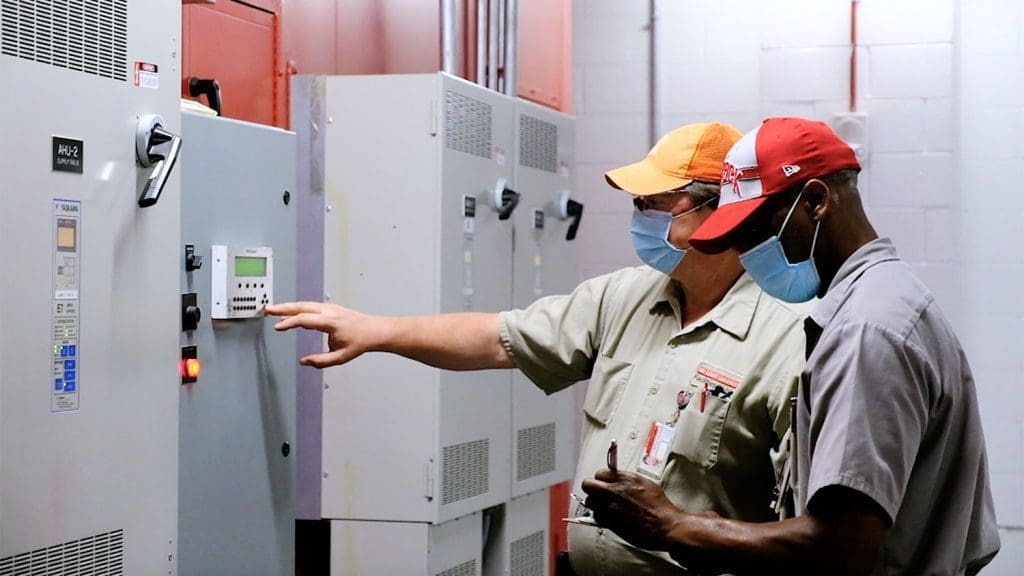
check the control panel of an HVAC system at NC State.
Facilities Division and Environmental Health and Safety
NC State University
Employees in the Facilities Division and Environmental Health and Safety at NC State University have worked tirelessly since last spring to develop and implement a comprehensive indoor air quality plan that aims to keep students, faculty and staff safe.
“There are many actions together that create a safe and healthy indoor environment for our facilities, starting with the university’s community standards for mandatory face coverings, physical distancing and reduced occupancy,” said Allen Boyette, senior director for energy systems. “A properly operating HVAC system is one more way to ensure a safe indoor environment.”
Over the summer, the division evaluated every university HVAC system, and a team from Facilities and EHS worked together to assign an indoor air quality rating to each building.
Facilities staff conducted preventative maintenance cycles on the systems, replacing filters and verifying that the outdoor air ventilation systems were working properly.
Based on the indoor air quality rating for each building, they also implemented a number of additional measures:
- Reprogramming HVAC systems across campus to provide more outside air.
- Extending the operating schedules of HVAC systems by two hours before and after the normal building occupancy schedules, providing additional ventilation.
- Identifying buildings that needed additional actions, such as portable HEPA units.
All this hard work during the pandemic will benefit the university for years to come.
A properly operating HVAC system is one more way to ensure a safe indoor environment.

Jason Bohon
UNC School of the Arts
During an era of masks and social distancing, it’s easy to feel misunderstood.
Jason Bohon, a drama professor at the UNC School of the Arts, is helping his students overcome that challenge.
“The human face contains 42 muscles that we use every day,” Bohon said. “These muscles allow us to convey emotion and to communicate how we feel.”
Bohon trains acting students in movement, mask and devising. The mask curriculum is designed to help actors learn to use their entire body to communicate. That skill that has become increasingly valuable and applicable to all during the COVID-19 pandemic.
Wearing a mask that covers nearly half the face blocks subtle facial cues that one uses to understand how someone feels about something.
“The eyes can convey a lot,” said Bohon. For example, furrowing your brow or narrowing your eyes shows concern. A tilt of the head shows hesitation. You can use your eyes to convey a positive response as well. Lift your eyebrows to show a desire to connect. A smile underneath your mask moves muscles around your eyes, and can create a friendly, welcoming gleam in the eye.
“Keep in mind that you can use your eyes, eyebrows, hand gestures and your physical posture to communicate how you’re feeling so that you can continue to connect,” Bohon said. “It might just be the thing someone needs to get them through the day.”
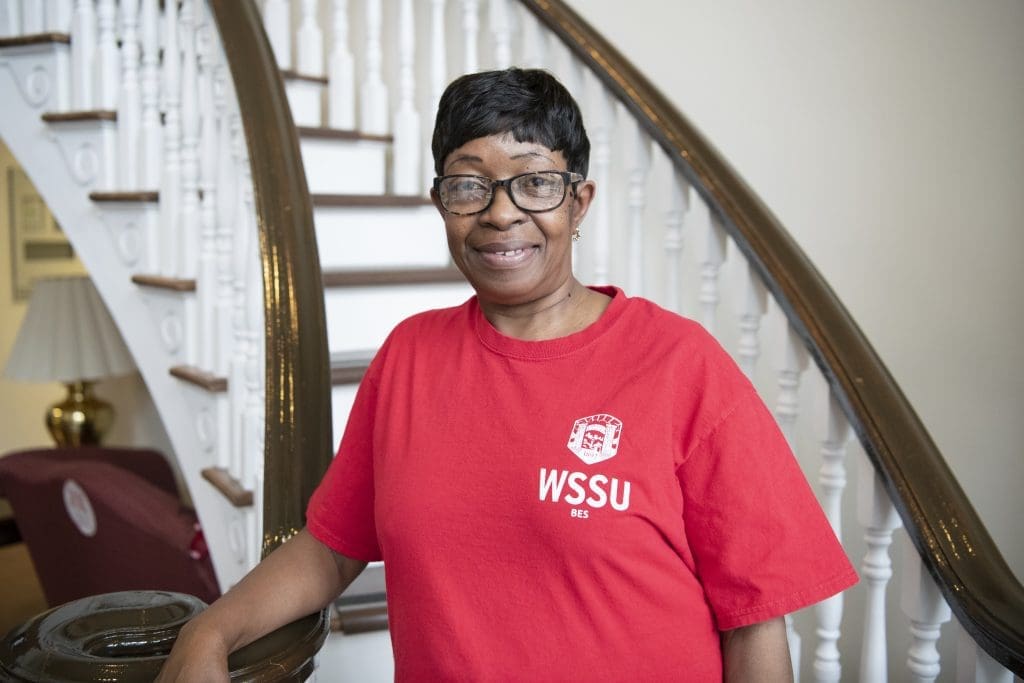
Arealer Eldridge
Winston-Salem State University
Much has been said about the tenacity and bravery of essential workers as we’ve navigated the past year of a global pandemic. At Winston-Salem State University, some of the most essential workers have been housekeeping staff who have stepped up to keep the campus running.
Arealer Eldridge is one of those selfless employees. She’s been making WSSU shine for the past eight years as a building and environmental services technician. With the onset of COVID-19, Eldridge made it her mission to ensure facilities were clean, sanitized and safe for students, faculty and staff.
Eldridge is an early bird, often arriving well before her shift starts to make sure things are in order. She never hesitates to lend a helping hand. Almost daily, you can hear her telling her colleagues “chop-chop,” meaning “let’s get to it!” She takes pride in every task she’s asked to perform. Eldridge has a warm disposition and is loved by everyone on campus.
“Mrs. Eldridge is truly a gem here at WSSU,” said Jimmy Norwood, assistant vice chancellor for facilities. “She approaches her job with a level of professionalism that is often hard to find. Her kindness and warm spirit spill over into everything she does. The past year has been challenging, but she’s shown up without complaint and done a fantastic job. We are so thankful to have such a shining star on our team.”
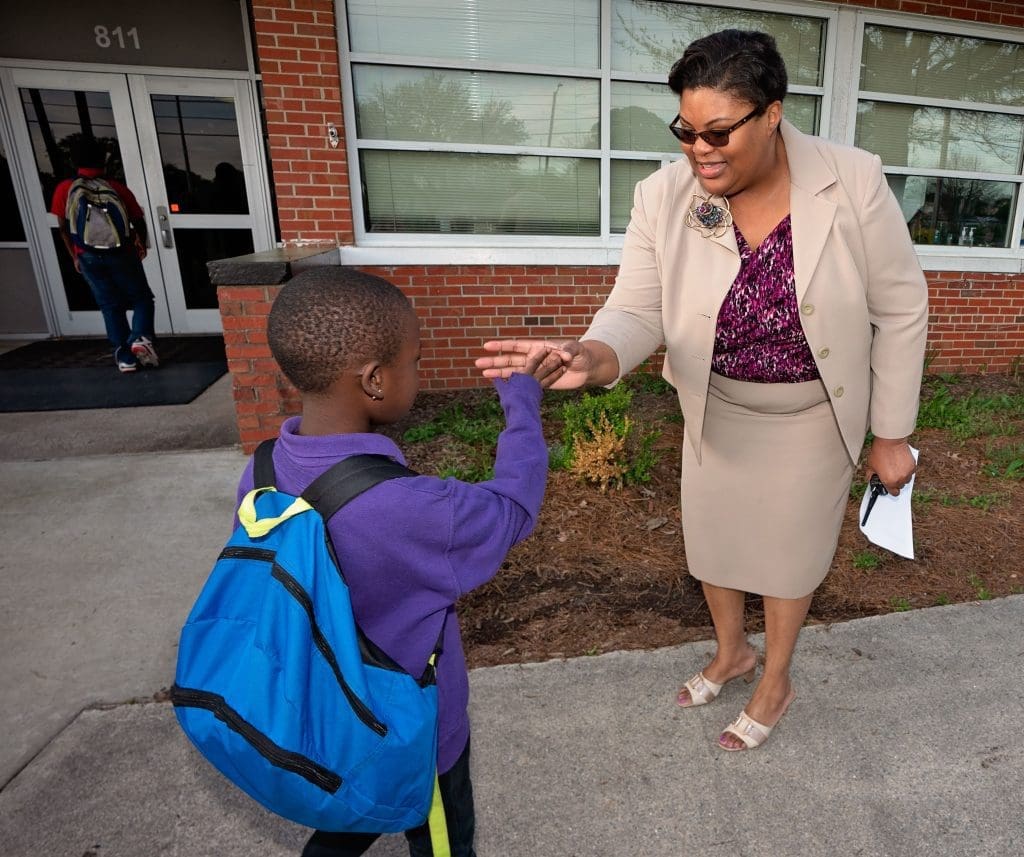
(ECU Photos by Cliff Hollis)
Tracy Cole
East Carolina University
Tracy Cole believed it was crucial that students at East Carolina University Community School be able to attend in-person classes during the COVID-19 pandemic.
Cole is the school’s principal, leading a laboratory school collaboration between ECU’s College of Education and Pitt County Public Schools. Because of her efforts, the school, which serves children in grades Pre-K through five, was open for in-person learning for more than 90% of the 2020-21 academic year. This allowed staff to monitor the academic, physical, social and emotional needs of students.
Cole helped her staff put protocols in place to create the safest learning environment possible for students, faculty and staff. Families were offered in-person and virtual learning options. Due to the school’s one-to-one technology model, all students were able to check out a laptop.
In-person learning is vital to the development of children, especially those who are in elementary school, Cole has found. About 88% of Community School students live at or below the poverty line. Another 82% have undergone at least one adverse childhood experience. To level the playing field, Cole works with community partners to meet her students’ needs, providing access to a food pantry and employing a full-time counselor and social worker.
“As a school family, we recognize that this pandemic will end one day. Therefore, our children need to be prepared to work and compete in a COVID-free environment. As a staff, we are committed to leveling the playing field for our children, ensuring that they have the best learning opportunities possible and that they are able to continue to thrive, even in the midst of a pandemic.”
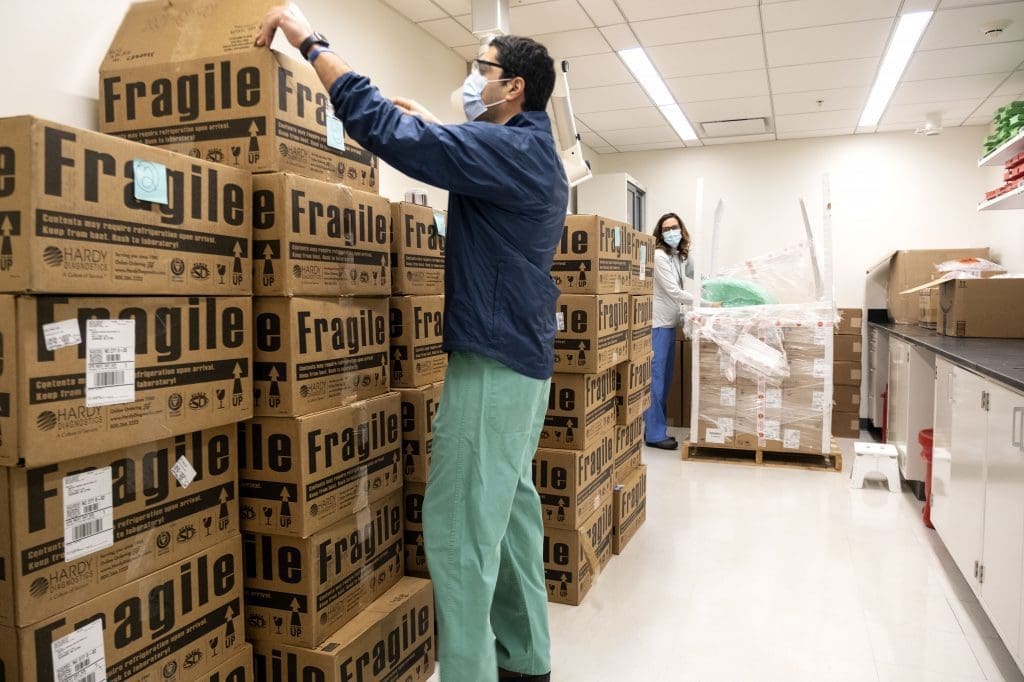
Amir Barzin
UNC-Chapel Hill
Amir Barzin is an assistant professor at the UNC-Chapel Hill School of Medicine and serves as the medical director for the UNC Family Medicine Center. In addition to his teaching and administrative duties, Barzin oversaw the creation of the Carolina Together Testing Program, the single most important tool for keeping students, staff and faculty safe. Although the number of students living on campus this semester roughly doubled since fall of 2020, COVID-19 positivity rates plummeted. Since the program began on Jan. 11, the weekly and twice-weekly testing of everyone coming to campus has kept the asymptomatic positivity rate below 0.5%.
Barzin’s talents, hard work and tireless leadership helped the program succeed. Starting last October, he and his team worked long hours to build the program from scratch. Students and employees can submit a sample within a few minutes at three testing sites. A state-of-the-art polymerase chain reaction (PCR) processing lab allows for same-day test results.
“I’m honored to be involved,” Barzin said. “I love this University. I don’t think I’d be where I am if I didn’t have an undergraduate degree from UNC-Chapel Hill. There’s no greater gift in my mind than giving back to our university community.”
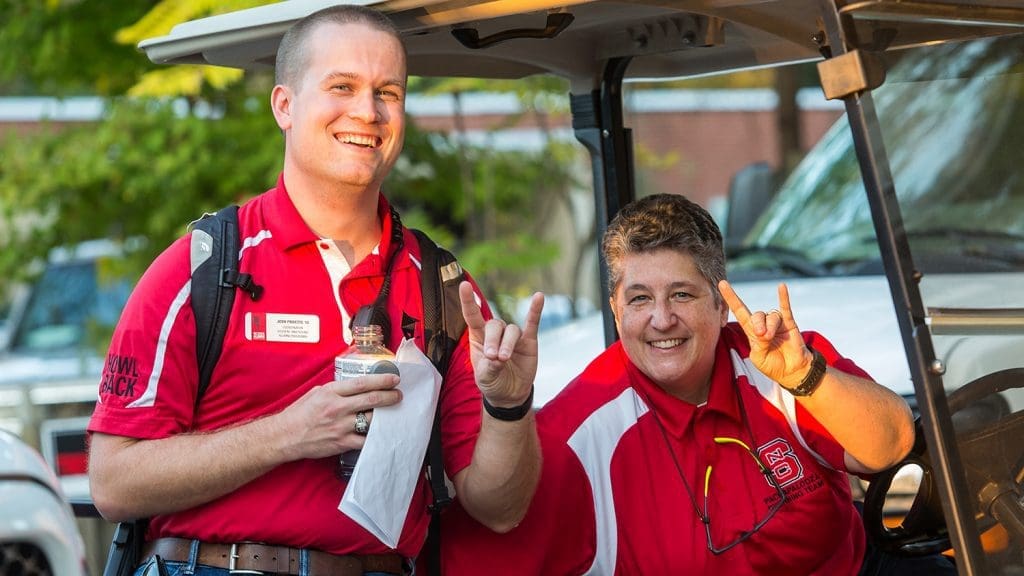
Josh Privette and Justine Hollingshead
NC State University
When a powerful storm marched up the Interstate 95 corridor in April 2011, spawning dozens of tornadoes around Raleigh, NC State University political science major Josh Privette was hunkered down in his dorm room in Wood Residence Hall.
“I dove into the bathroom and just hoped a tornado wasn’t going to come right over me,” he said.
Privette, now associate director of development in the Division of Academic and Student Affairs, recalled that short-lived brush with disaster last spring as NC State faced a calamity of another sort: the emerging coronavirus pandemic.
With campus operations sharply curtailed and classes suddenly moved online, the university was flooded with calls from students, parents and employees trying to understand and adjust to the changes.
“This is unprecedented for all of us,” he said in an interview last March. “There’s just a lot of uncertainty as we get used to a new normal.”
Privette pitched in with a team of about three dozen employees running the Wolfpack Response Line. The free hotline service, available Monday through Friday from 8 a.m. to 5 p.m., provides quick, accurate information on a wide range of topics.
Justine Hollingshead, assistant vice chancellor for academic and student affairs, spearheaded the effort to create the response line three years ago in the aftermath of Hurricane Matthew.
Hollingshead says the service shows the power of community.
“I’ve seen it time and again, no matter whether it’s a hurricane or a pandemic, people take pride that this is NC State. The Wolfpack is a family, and people want to give back.”
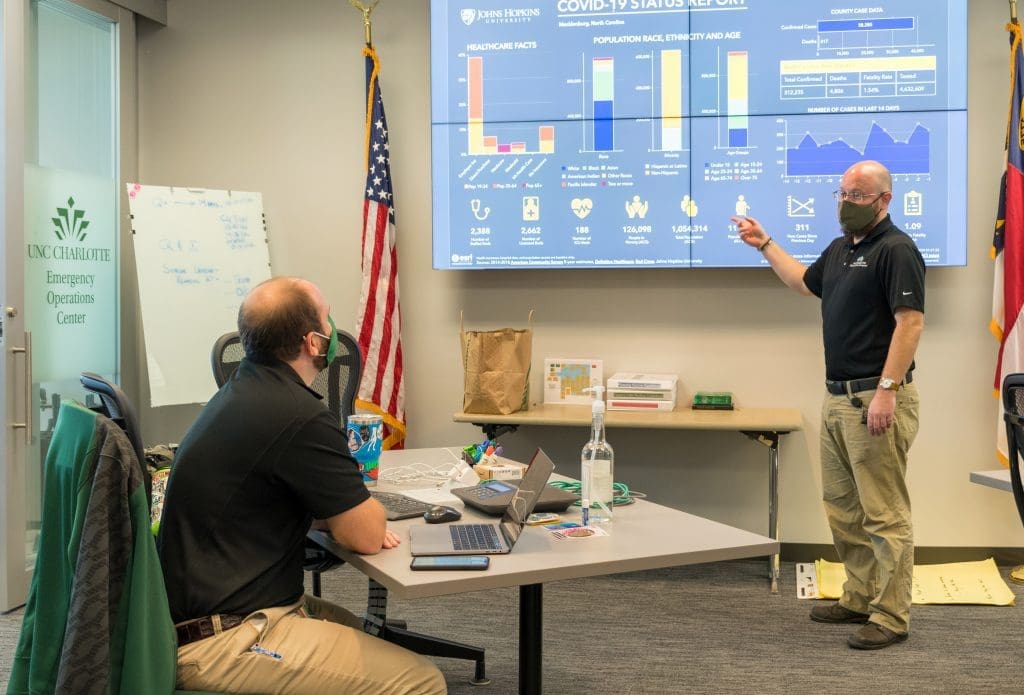
Kevin Martin
UNC Charlotte
Kevin Martin is the emergency preparedness coordinator at UNC Charlotte. While his typical year involves drafting, updating and maintaining the university’s emergency operations plans, his duties significantly expanded due to the pandemic.
Martin, an alumnus of UNC Charlotte, has acted as both operations and planning section chief in the institution’s emergency operations center. In these positions, he has overseen the university’s COVID-19 registry, which includes hundreds of potential cases each day. He coordinates surge testing in residence halls when positive wastewater samples are found. Martin follows through with quarantine and isolation protocols (which he helped develop) for any positive cases and close contacts. He also helped prepare plans for a potential field hospital and mass vaccination events. All of these tasks have been added to his regular responsibilities.
Martin is driven to make a difference for the university’s students and his colleagues. This dedication is evidenced by his decision to work during campus holidays — including Thanksgiving and Christmas — to ensure students had the services they needed.
“Nearly two decades ago, when I started in the field of emergency services, I would never have imagined that a response to a global pandemic would consume so much of my life,” he said. “But it has truly been an honor to serve my alma mater during these challenging times.”
It has truly been an honor to serve my alma mater during these challenging times.
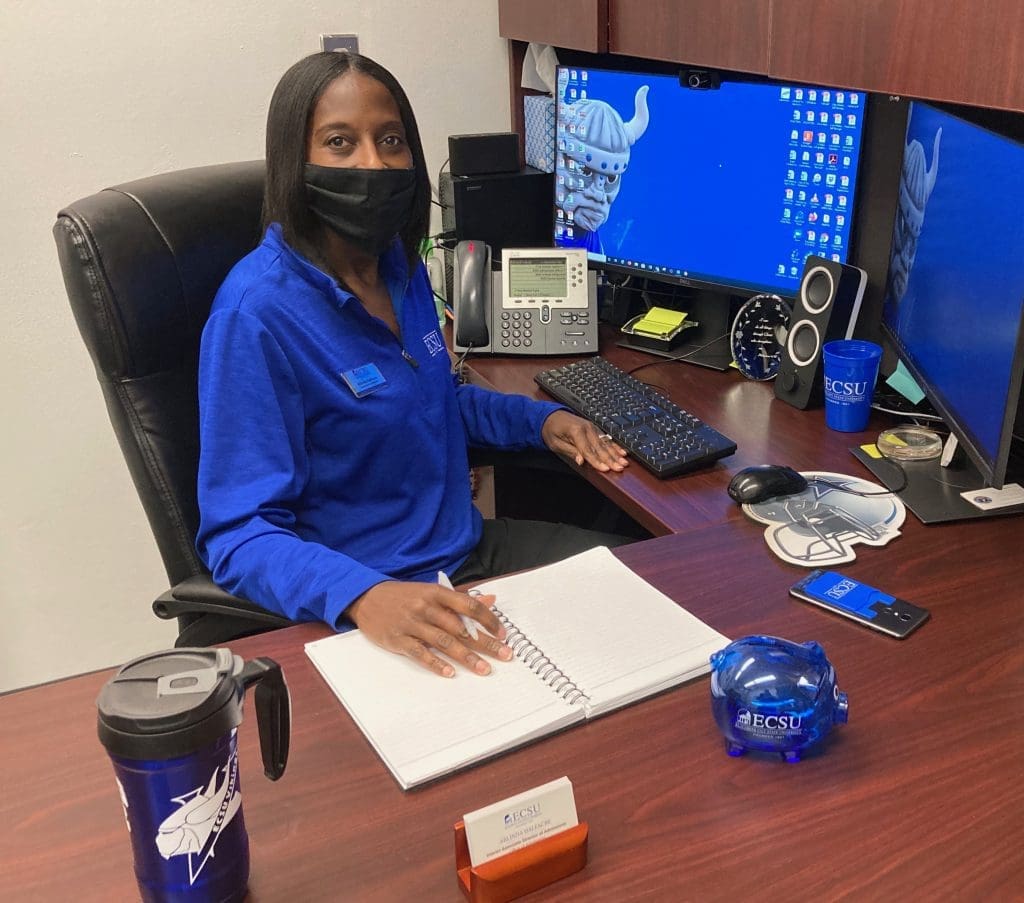
Arlinda Halfacre
Elizabeth City State University
Arlinda Halfacre loves her alma mater, Elizabeth City State University, so much that she is currently the interim associate director of admissions, guiding future Vikings through the admissions process.
A veteran of the U.S. Army, Halfacre was the first in her family to graduate from a university. That’s why working in ECSU’s Office of Admissions is important to her.
“When I came to campus as a student in 1987, there were staff members who treated me like family and took me under their wings to show me the ropes,” she said. “I wanted to be a part of the same family environment for other prospective students and their families.”
She first held a position in the Office of the Registrar and eventually made her way to admissions. Once in admissions, Halfacre began learning the process and assisting students. That’s her true passion.
“My job never stops there,” she said. “I let the students know that I am here to assist them on their academic journey. Even after they have been enrolled, the students know that I am only a phone call away to assist them or their parents.”
Halfacre’s dedication to ECSU keeps her busy, but that doesn’t stop her from serving others in her community. She serves as the pastor of New Life Christian Ministries, the president of the Elizabeth City Area ECSU Alumni Chapter, chaplain for the ECSU National Alumni Association, Inc., and captain for New Life Christian Ministries Relay for Life team.
The students know that I am only a phone call away to assist them or their parents.
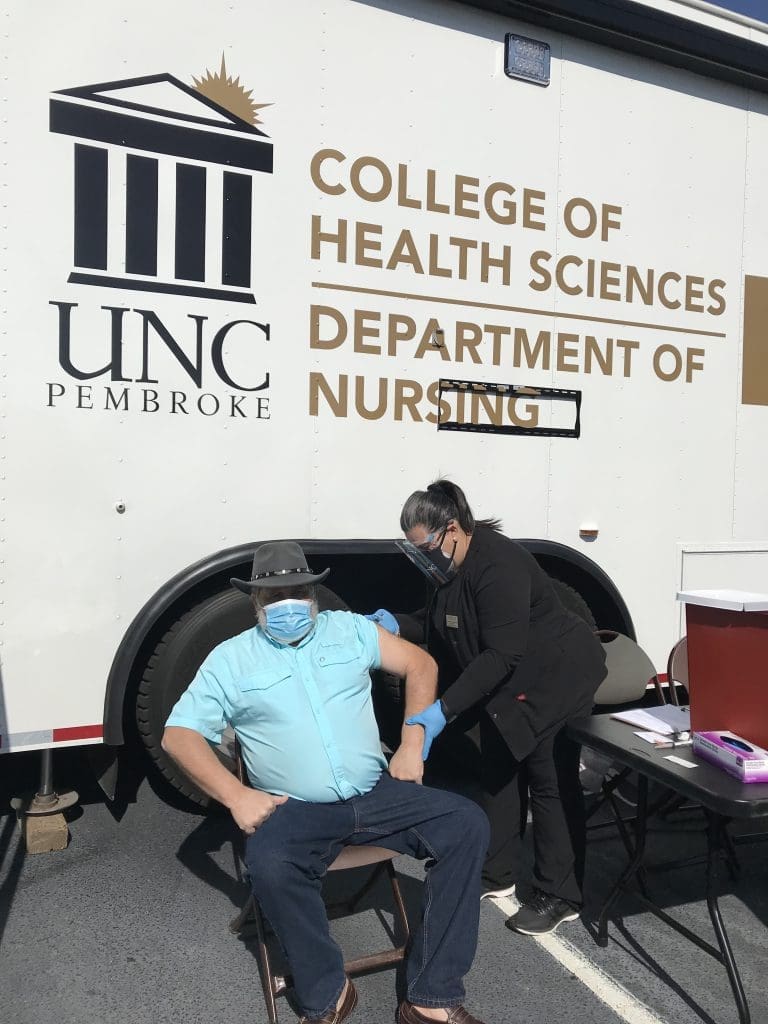
Jennifer Jones-Locklear
UNC Pembroke
Nursing students at UNC Pembroke have leaned on Jennifer Jones-Locklear and other faculty since the pandemic turned everyone’s world upside down.
Jones-Locklear was there when students, for safety reasons, were not allowed to return to clinical sites. Under Jones-Locklear’s watchful eye, they successfully completed their clinical hours using clinical scenario software. Jones-Locklear introduced innovative ways for students to meet the required clinical and capstone course hours.
In the last year, as UNC Pembroke’s nursing students were thrust into real-world experience administering COVID tests, participating in vaccine clinics and conducting serology studies, Jones-Locklear has been there, guiding them each step of the way. She’s been on the front lines, shoulder to shoulder with students and community partners.
“It’s terrible what was going on in our community, but the pandemic has presented a perfect opportunity for our students to gain hands-on experience,” Jones-Locklear said. “They are witnessing research in action, learning about community health, public health and getting the opportunity to interact, educate and build that trust with the community.”
She has been heartened by how the community has rallied behind health care workers.
“The most profound thing happened when I and a colleague were waiting in line to get our COVID vaccine at the health department. It was 30 degrees that morning, freezing cold. There was a long line of elderly individuals — 75 and older — in front of us. Some with walkers. When they saw our uniforms and learned we were nurses at UNCP, they said ‘We want y’all at the front of the line because you are the ones out here every day helping us,’” she said through tears.
[Our students] are witnessing research in action, learning about community health, public health and getting the opportunity to interact, educate and build that trust with the community.
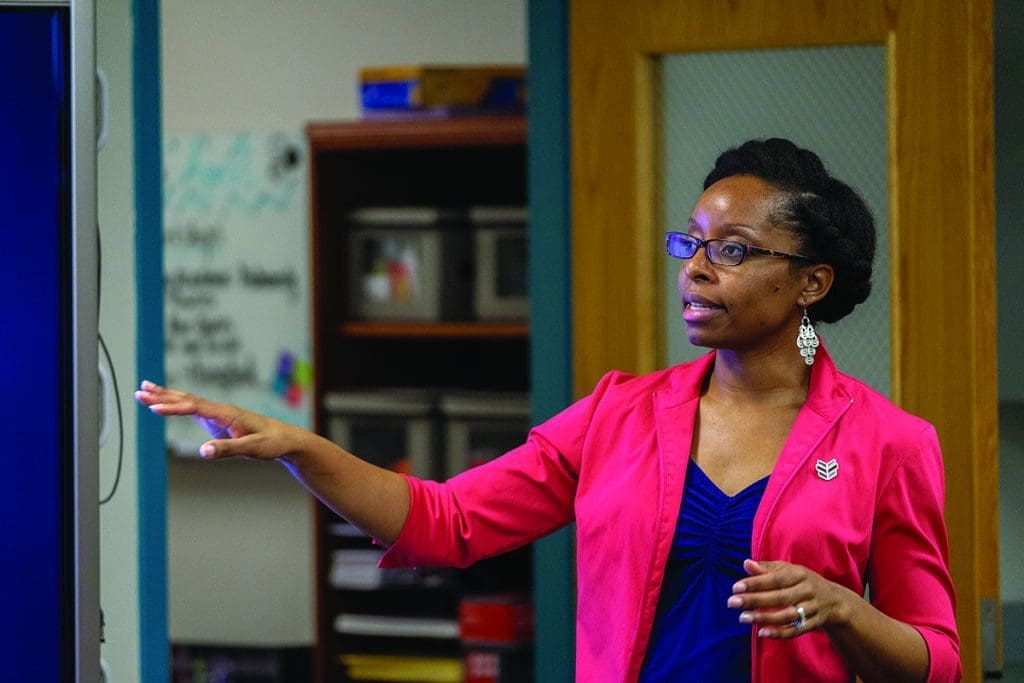
Racheal Brooks
NC Central University
As the coordinator of North Carolina Central University’s Office of e-Learning, Racheal Brooks has long championed quality online education. Her passion and expertise resulted in a smooth transition to remote learning during the COVID-19 pandemic.
The Office of e-Learning supports faculty in the development, implementation and evaluation of online, hybrid, and web-enhanced courses at NCCU. It also ensures students can continue their courses, remain on track, maintain accessibility and successfully meet course objectives.
During the coronavirus pandemic, Brooks and two team members in the Office of e-Learning provided direct support to approximately 500 NCCU faculty members. They also spearheaded development of several online courses through the University of North Carolina System Course Enhancement Initiative.
“NCCU’s motto of ‘Truth and Service’ is a charge that I hold dear to my heart since my undergraduate years at NCCU,” Brooks said. “I am overcome with gratitude to know that I am helping to make a difference as we work together to provide high-quality online learning experiences for students.”
The Office of e-Learning has also developed the NCCU Instructional Continuity Lesson that assists faculty in ongoing instruction in the online environment.
Over the past year, the Office of e-Learning has reimagined trainings and course development models to create templates, resources and strategies supporting online, hybrid or remote course delivery.
Brooks is co-chair of the UNC System’s Quality Matters Council, where she assists in guiding a group of experts in developing an online learning community across the System and beyond, reaching all institutions of higher education in North Carolina.
Recently, she was awarded the 2019 Directors’ Award for Exceptional Service Representing Higher Education during the national Quality Matters virtual conference.
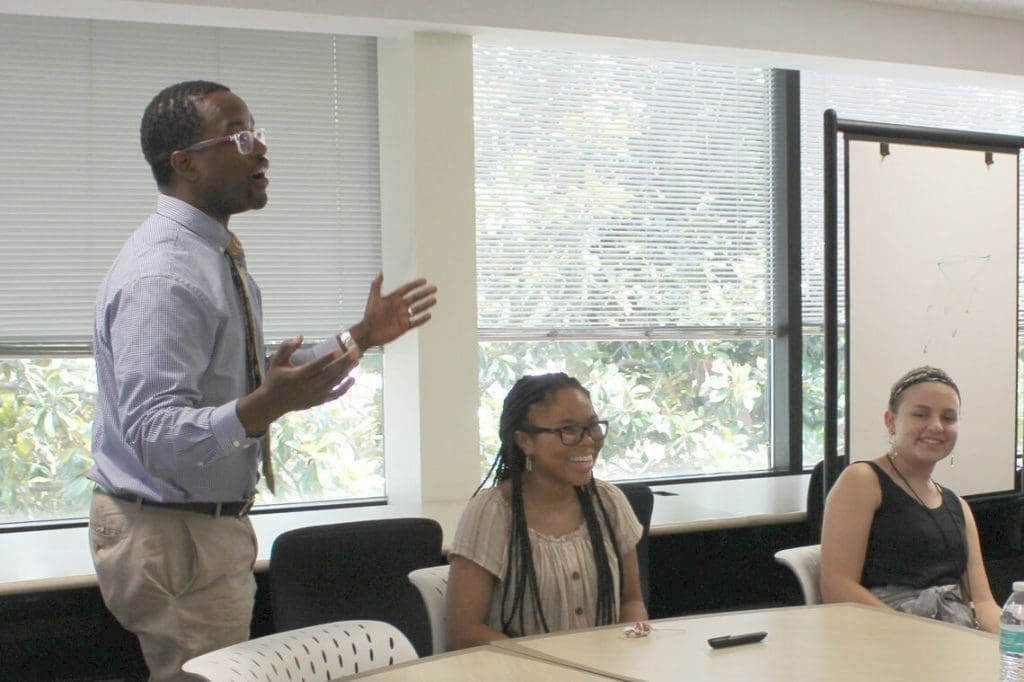
Jamie Lathan
North Carolina School of Science and Mathematics
When it came time for UNC System institutions to pivot from in-person learning to online classes in 2020, The North Carolina School of Science and Mathematics had some wisdom to share.
Some faculty at NCSSM, North Carolina’s two-year, public residential high school, are particularly adept at teaching online. The NCSSM Online program allows students to spend two years dually enrolled, learning remotely from NCSSM while remaining at their home high schools. The school also offers Open Enrollment, an option where students can take an online class to fill gaps in their curriculum. The format allows NCSSM to serve hundreds of students from all corners of the state.
Jamie Lathan, NCSSM’s dean of distance education, has years of practice teaching via NCSSM Open Enrollment distance education courses. Last year, he lent helpful advice to other faculty who were less familiar with online class methods.
“Communication in any learning, really, cannot be underestimated,” he said. “In a remote context, you can’t really over-communicate.”
“Email regularly,” Lathan said. “Post assignments in a timely manner, provide students with multiple ways to contact you, make yourself available, and be there.”
Be flexible and understanding, he added. Encourage students to build community, and foster collaboration in the virtual classroom.
“Don’t be just a talking head in Zoom.”
In a remote context, you can’t really over-communicate.
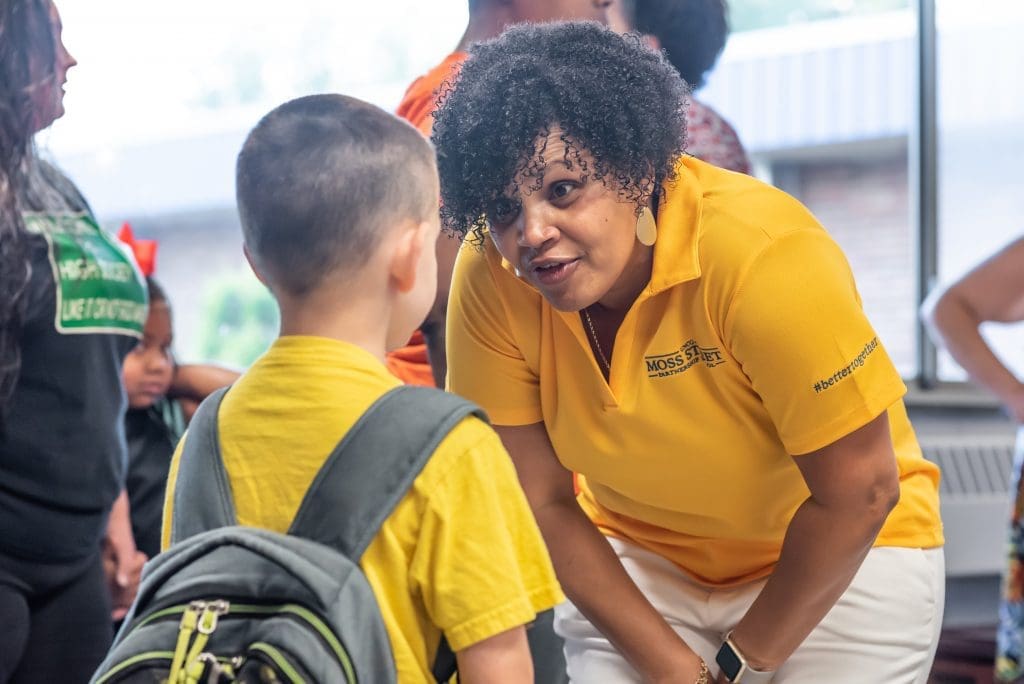
Catina Chestnut
UNC Greensboro
When Catina “Tina” Chestnut was named principal of Reidsville’s new Moss Street Partnership School (MSPS) in spring 2018, it felt like a no-brainer. MSPS is a collaborative effort between the University of North Carolina at Greensboro, Rockingham County Schools, and the city of Reidsville.
There is no educator more familiar with these communities than Chestnut.
An alumna of UNC Greensboro and Appalachian State University, Tina has been a North Carolina educator for more than 20 years. She taught middle and high school math and science in Guilford and Rockingham counties and was an assistant principal at Dalton L. McMichael High School. She also served as principal at John W. Dillard Elementary School, Moss Street Elementary School (prior to it becoming Moss Street Partnership School), and Bessemer Elementary School. Chestnut is a native of Reidsville. She also grew up attending Moss Street Elementary school herself!
Students in Rockingham County are eligible to attend MSPS for free and can take advantage of the school’s STEAM curriculum – science, technology, engineering, arts and mathematics – along with the new nature learning trail in the woods behind the school. Bus transportation, breakfast and lunch, physical education, after school programs and tutoring are provided for students.
MSPS had been up and running for less than two years before the COVID-19 pandemic hit. Under Chestnut’s leadership, the school distributed more than 230 iPads to support students as they shifted to remote learning in April 2020. MSPS opened up for in-person learning at the beginning of March 2021.
“We are so excited to have the students back,” said Tina. “Our teachers have been working overtime to prepare their classrooms and provide an engaging and safe environment for our students. Words can’t describe how much we have missed seeing their faces.”
Our teachers have been working overtime to prepare their classrooms and provide an engaging and safe environment for our students.
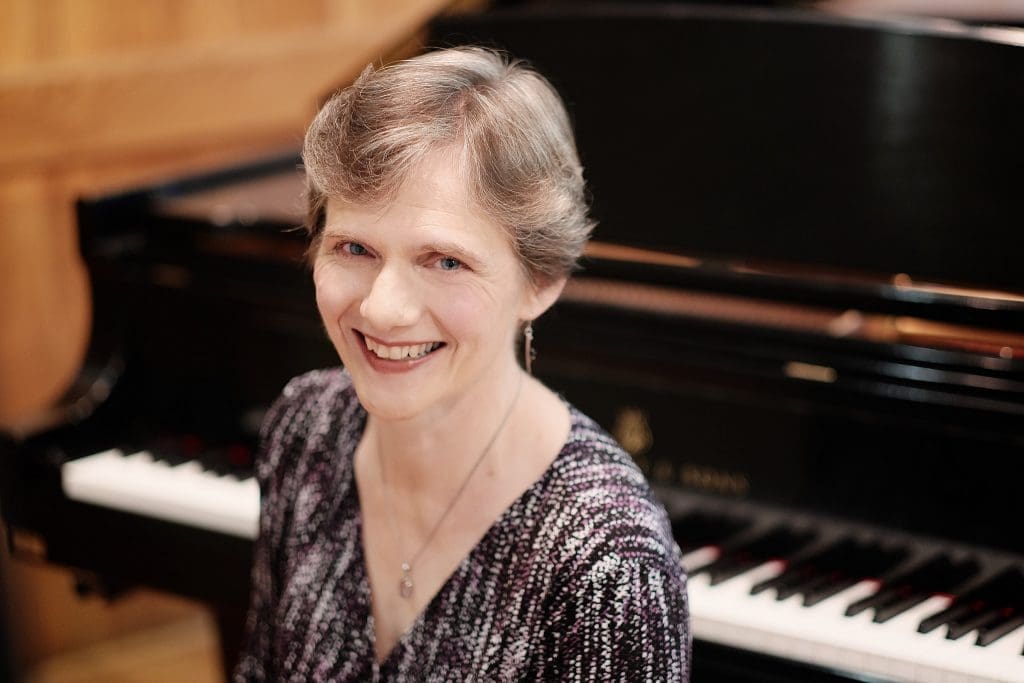
Allison Gagnon
UNC School of the Arts
Inspired and informed by her own experiences with both her parents, Allison Gagnon has pioneered an interactive music program for people with dementia. Gagnon is a piano professor at UNCSA’s School of Music.
Music can reach those who have become uncommunicative, Gagnon has found.
“What we really need are boots on the ground,” Gagnon says. “One of the biggest issues with dementia care is that there is not enough contact time with people, and caregivers are occupied first with physical needs.”
“What if every music student learned the skills that allowed them to interact with individuals living with dementia to create moments of joy and connection? What if caregivers learned to use music in the care of their loved ones?”
That’s where the school’s community engagement program, ArtistCorps, comes in. ArtistCorps utilizes the skills of students and graduates to provide arts instruction, integration and exposure to school-aged children and seniors in the Winston-Salem community. Through the program’s existing framework, students interested in community engagement opportunities were matched with Gagnon’s project.
Together, they brought a Morning Music Club to Williams Adult Day Center in Winston-Salem. Gagnon and the students use a keyboard and other instruments to lead the participants in song — everything from well-known campfire tunes and spirituals to pop music from the participants’ younger days — singing with them and encouraging them to participate with egg shakers, rhythm sticks and dancing.
Gagnon is also working to secure funding to make it possible to scale all their resources, so that other music schools can embark on similar work.
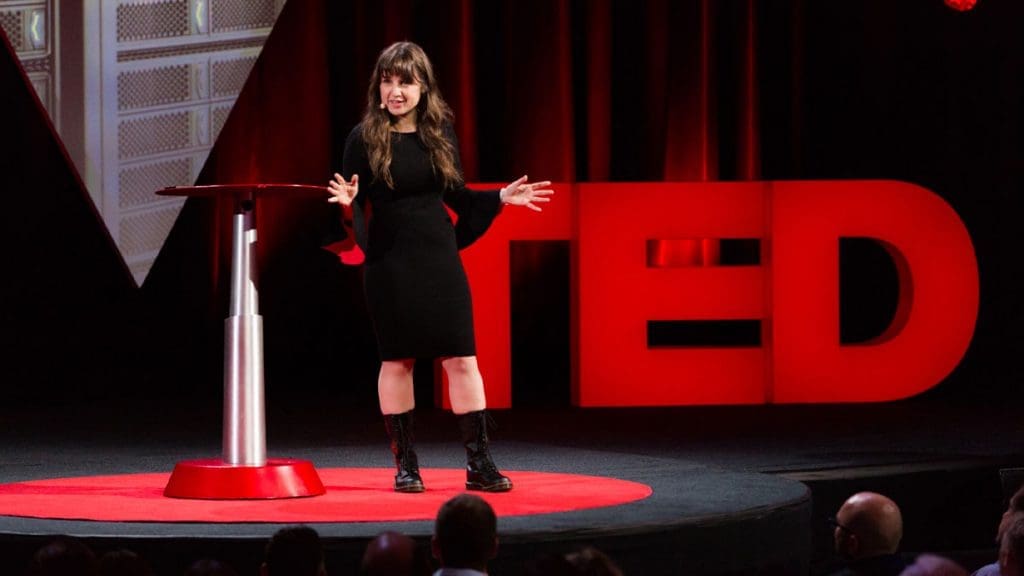
Zeynep Tufekci
UNC-Chapel Hill
Zeynep Tufekci is a social scientist whose work focuses on the intersection of society and technology.
Even though she’s not a medical doctor, her scholarship involving COVID-19 has had a significant influence on health policy makers, scientists and the public. She has written extensively about the pandemic, bringing expert analysis, critical commentary and proposed solutions.
Tufekci is an associate professor in UNC-CH’s School of Information and Library Science and a principal researcher with Carolina’s Center for Information, Technology and Public Life.
Her work on the spread of misinformation in digital media was highly praised during the pandemic. Last fall, the New York Times credited Tufekci with “getting the big things right,” not only about COVID-19, but also in her previous analyses of Twitter’s impact on social movements, media coverage of school shootings and the risks of radicalization via YouTube.
In February of 2020, Tufekci published a blog for Scientific American with common-sense advice on how Americans could prepare households and amend lifestyles for a virus that was spreading quickly.
She challenged early guidance from World Health Organization and the Centers for Disease Control and Prevention that masks weren’t helpful for the public – statements that were eventually reversed. She also admonished media for shaming people for going to the beach or public parks – places that offered relative safety for the pandemic weary.
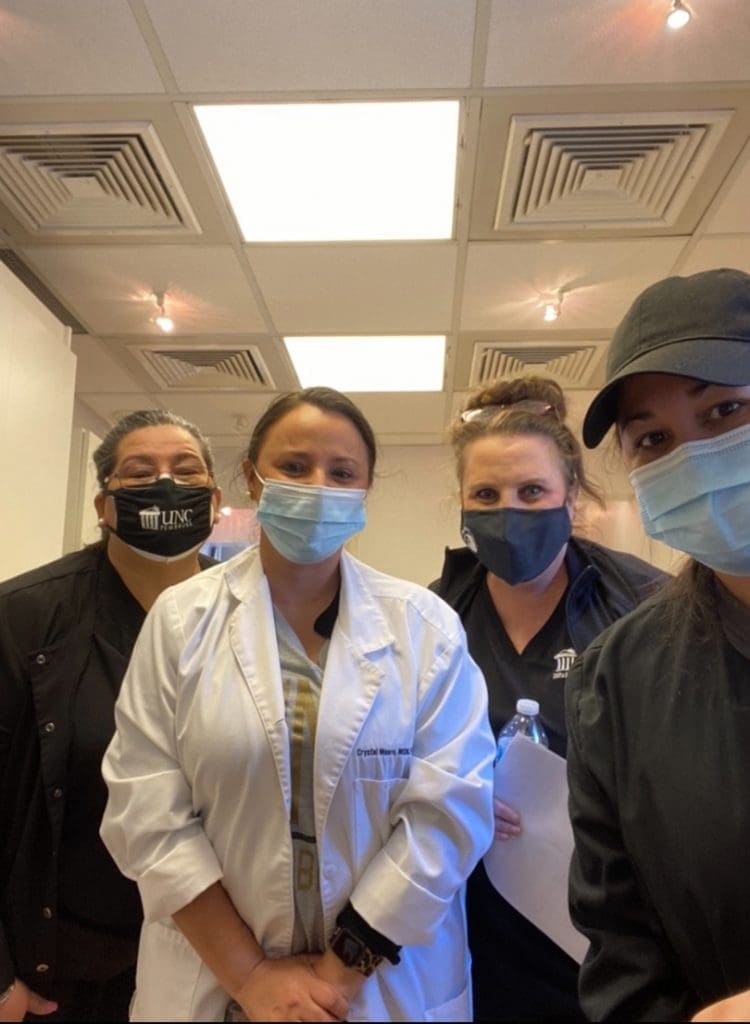
Crystal Moore
UNC Pembroke
Dr. Crystal Moore and her capable team of nurses at UNC Pembroke have been operating in overdrive since the pandemic began. They have no plans of letting up.
Moore has been leading the charge on campus and in the community, prioritizing and coordinating proactive measures in order to maintain safety and help mitigate the spread of the virus. In early March 2020, the Brave Health Center quickly became the epicenter of all communication, with staff responding to hundreds of calls related to state guidelines, symptoms, PPE distribution and treatment. Currently, they are answering myriad questions about testing and vaccines.
Through it all, Moore has been guiding the ship. The university’s leadership has leaned on her expertise in daily cabinet meetings. She has taken an active role in the community, sharing knowledge with her counterparts at county and state levels in a unified effort to prevent outbreaks. Moore has also used her position as health director to educate the campus community, offering resources and reminding students of the consequences of failing to adhere to safety protocols.
“It’s been truly a team effort,” she said.
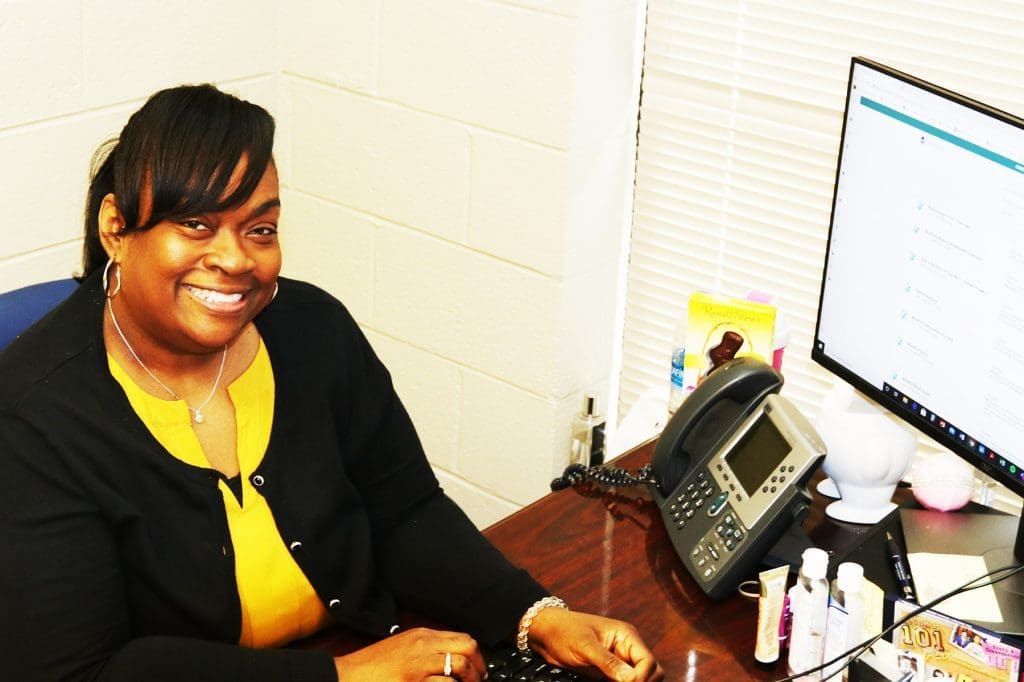
Jody Grandy
Elizabeth City State University
Jody Grandy is committed to protecting the mental health of students at Elizabeth City State University, especially given the stress of the coronavirus pandemic.
“You’re not alone and you have support,” Grandy, ECSU’s director of counseling services, tells students.
The ECSU campus counseling staff is small, so Grandy is innovating, finding ways to serve every person who may be struggling. One such innovation, Therapy Assistance Online, provides educational tools for people who suffer from high levels of anxiety and depression.
“[The program holds] a large library of mindfulness techniques to help you cope and develop a happy place and minimize anxiety,” Grandy said. “It’s a way to develop your own treatment module to help you cope better.”
Last summer, Grandy launched Viking Campus Advocates for Recovery and Educational Services, (Viking CARES), an effort targeting mental health and substance abuse issues. The Viking CARES mission is to provide prevention and treatment services to students, and to contribute to the holistic wellness of students in recovery, Grandy said. This will be done through professional and peer support, educational outreach and substance abuse counseling.
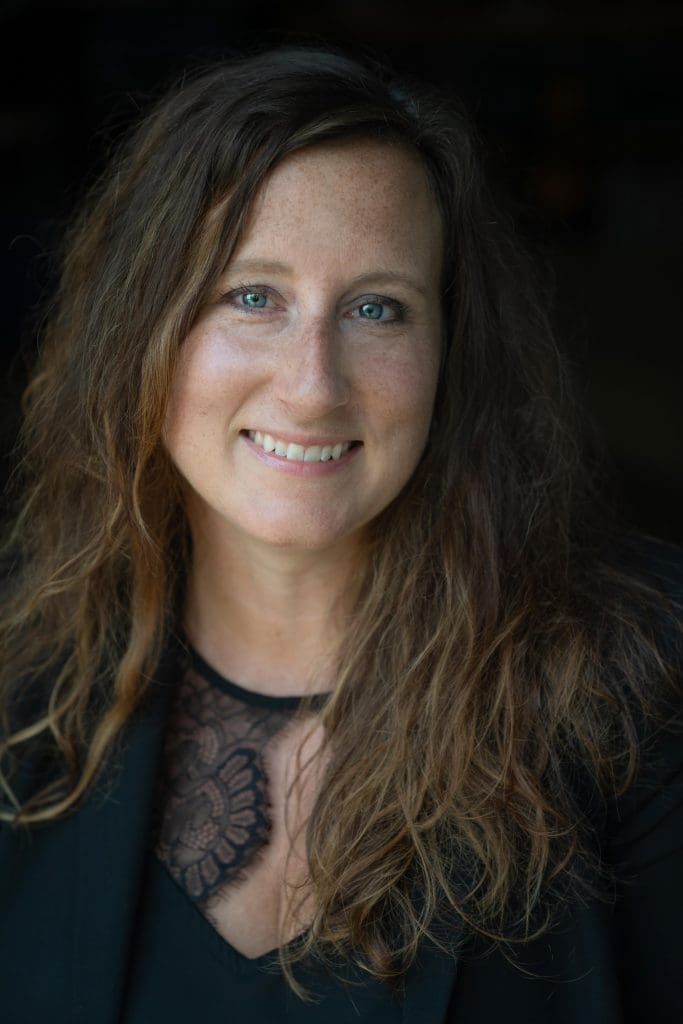
Lyndi Hewitt
UNC Asheville
Lyndi Hewitt, director of UNC Asheville’s Center for Teaching and Learning, understands the challenges of juggling multiple teaching styles during the pandemic. Hewitt offers invaluable resources and support to faculty who have navigated online and hybrid teaching models since the beginning of the pandemic.
It’s important that faculty choose tech tools that align with learning objectives and course goals, Hewitt said. Not every goal is served equally by the same tools or approaches.
“I’ve witnessed superhuman compassion and innovation,” Hewitt said of her colleagues. “We’ve gotten through this, and we’ve gotten through this together.”
In addition to leading the center, Hewitt is a sociology professor at UNC Asheville. Solutions to real-world problems are deeply important to students, Hewitt has found. Hewitt has used her expertise to collaborate with various organizations in the Asheville community, and she’s made her classroom the perfect springboard for students to get involved in that work, especially during the pandemic.
We’ve gotten through this, and we’ve gotten through this together.
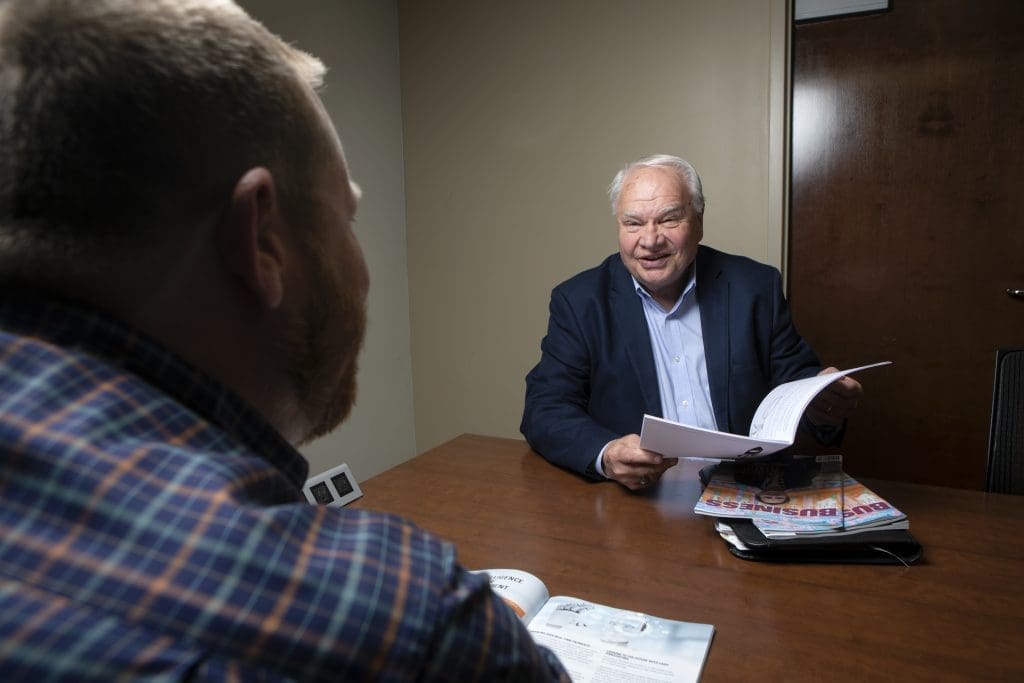
Ron Elmore
Appalachian State University
Appalachian State University’s Ron Elmore helped North Carolina’s small businesses reinvent themselves during the pandemic.
Elmore, who serves as regional director of Appalachian State University’s Small Business and Technology Development Center (SBTDC), helped small businesses in his community respond to the economic challenges of the pandemic. For example, a local printing company experienced a large decline in regular orders throughout 2020. Elmore’s team helped the company develop a new business stream: producing COVID-related retail signage and floor stickers to promote physical distancing and the wearing of face coverings.
Throughout the pandemic, SBTDC managed four times its normal caseload of clients. The team also handled incoming calls, reaching out directly to chambers of commerce and providing webinar content and expert resources to share with local businesses.
With offices in Boone and Hickory, the SBTDC offers no-cost, confidential business counseling, tools and advice to small companies in western North Carolina.
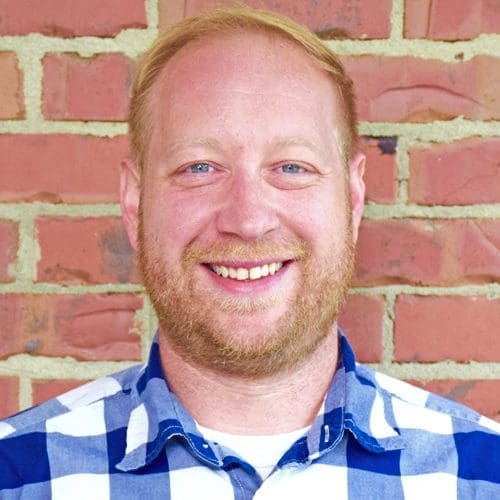
Ben Chapman
NC State University
When the pandemic hit, many Americans suddenly had questions about that most basic human need: food. Questions ranged from finding the safest way to get groceries to whether it was safe to order takeout. Ben Chapman, a food safety expert at NC State University, was able to give answers.
Specifically, Chapman focused on sharing information and evidence-based best practices with reporters and the public, reflecting our rapidly evolving understanding of COVID-19.
Since the beginning of the pandemic, Chapman has been interviewed more than 1,500 times by media outlets from around the world, sharing up-to-date information and food safety advice with millions of people in the U.S. and beyond.
Chapman also worked with NC State’s Safe Plates program to develop and communicate COVID risk reduction practices with thousands of food industry professionals and their employers.
Chapman created an international network of food and virology experts, called FoodCoVNET, to share data on the emerging pathogen. FoodCoVNET provided more than 160 resources in several languages. These resources addressed global food safety concerns related to everything from restaurants to food banks to farmers markets.
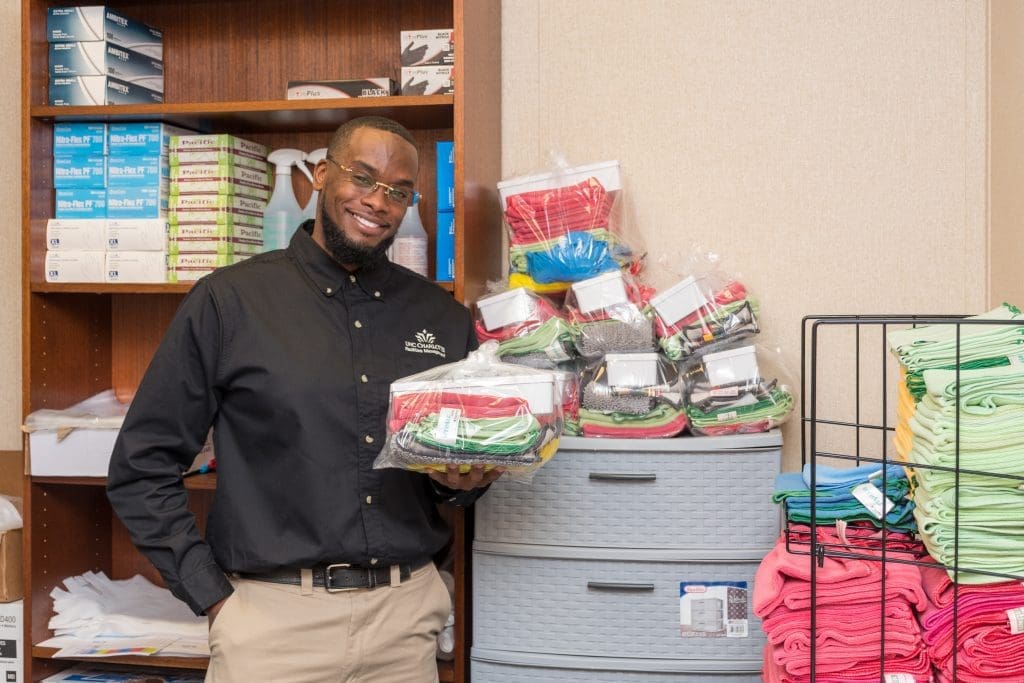
Tasheem Hayes
UNC Charlotte
Tasheem Hayes, a building environmental service supervisor at UNC Charlotte, is dedicated to keeping the campus healthy and safe every day.
Hayes leads his team of technicians by overseeing the efficient packaging of their daily supply kits. He also tests new chemicals to determine which are more cost-effective and neutral. In the wake of the pandemic, his team installed and continues to replenish hands-free soap dispensers across campus. He was also part of a team that researched ways to clean surfaces broadly and quickly. This led to the implementation of electrostatic sprayers, which distribute cleaning and disinfecting solutions around high-touch surfaces. As more machines are ordered, he continues to train technicians on the proper way to use them.
“I find great value in motivating employees and explaining the ‘why’ behind their work,” said Hayes. “Our job is bigger than the work itself. It’s about keeping others safe.”
Hayes believes that his team’s efforts helped the campus stay open during this pandemic.
“Our job is to make sure everyone finds comfort in knowing that this campus is safe and clean.”
Our job is bigger than the work itself. It’s about keeping others safe.
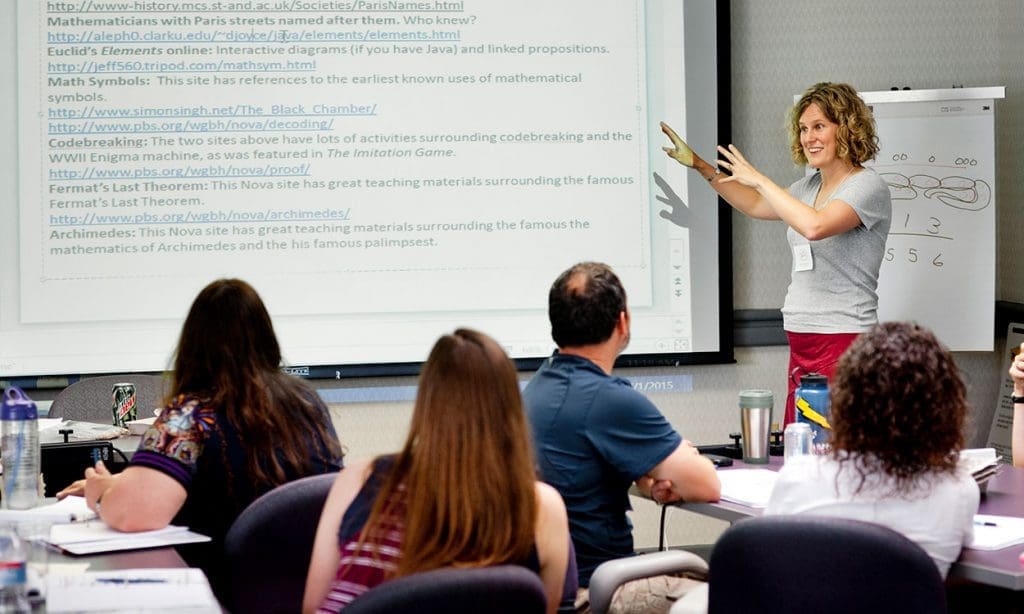
Sloan Despeaux
Western Carolina University
A professor at Western Carolina University is working hard to cure “math phobia.”
“If we don’t have math teachers in our K-12 schools, we are in big trouble in our communities,” said Sloan Despeaux, a professor for Western Carolina’s math department.
Despeaux’s job involves recruiting K-12 math teachers from around the state. She spends her days teaching, preparing lessons and grading assignments while also doing committee work and writing editorials. Despeaux works 12 months a year, teaching a variety of math courses that are helpful to teachers. She devotes summers and school breaks to research.
Despeaux’s goal is to “spread math love everywhere.” As part of that effort, she helped create the NC Network of Math Teachers’ Circles, a group that so far has received $500,000 in grants.
“My service directly helps math teachers locally and in the state,” Despeaux said.
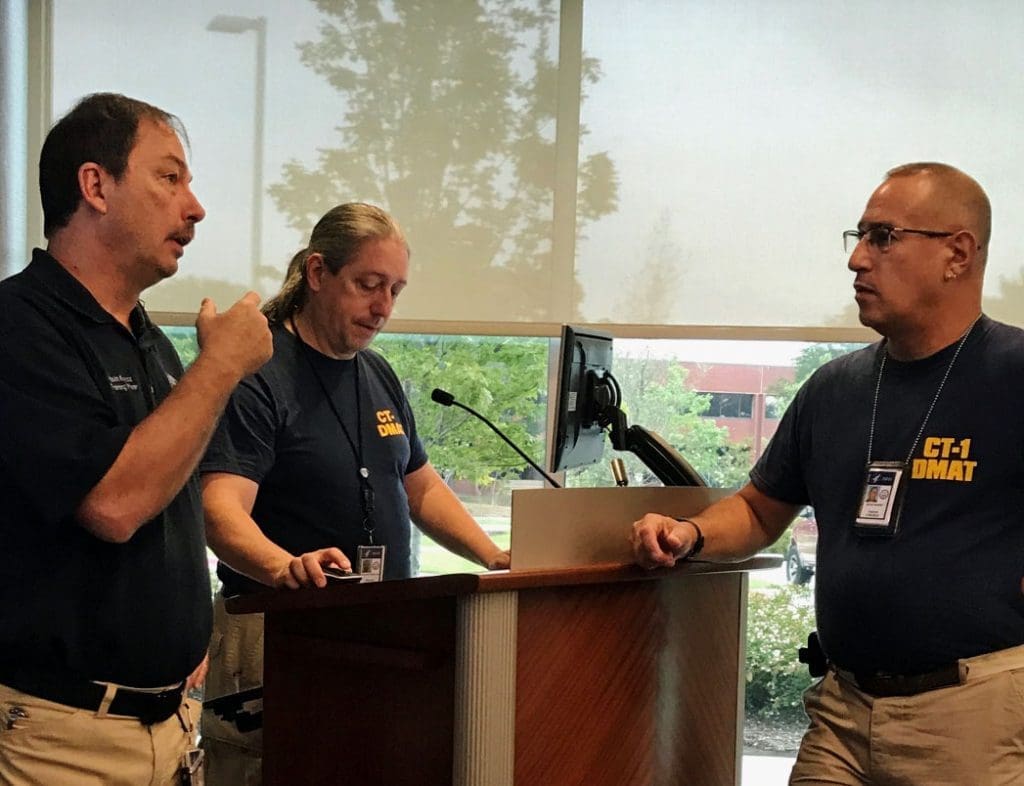
Kevin Kupietz
Elizabeth City State University
Last year, as the realities of the pandemic began hitting home in the United States, Kevin Kupietz, an emergency management professor at Elizabeth City State University, was called to action by a national task force.
Kupietz and his team worked on the front lines, aiding cruise ship passengers who’d been exposed to the virus.
Kupietz is no stranger to the demands of emergency management. If a national crisis emerges, Kupietz will likely be there, lending his expertise and years of experience as a paramedic and emergency management professional.
His job varies. Often, he organizes medical aid, food and shelter for victims of natural disasters. When Hurricane Harvey made landfall along the Texas coast in 2017, Kupietz, along with a team of trained professionals, worked to offer relief to storm victims in Houston.
Each time Kupietz is deployed, he returns to ECSU’s campus with personal experiences he can use as a teaching tool.
“It’s important that our students gain an understanding of emergency management beyond the textbook,” he said. “As an emergency management professional, I am able to illustrate to them the realities of the work we do in the field, and the work they may face as professionals after graduation.”
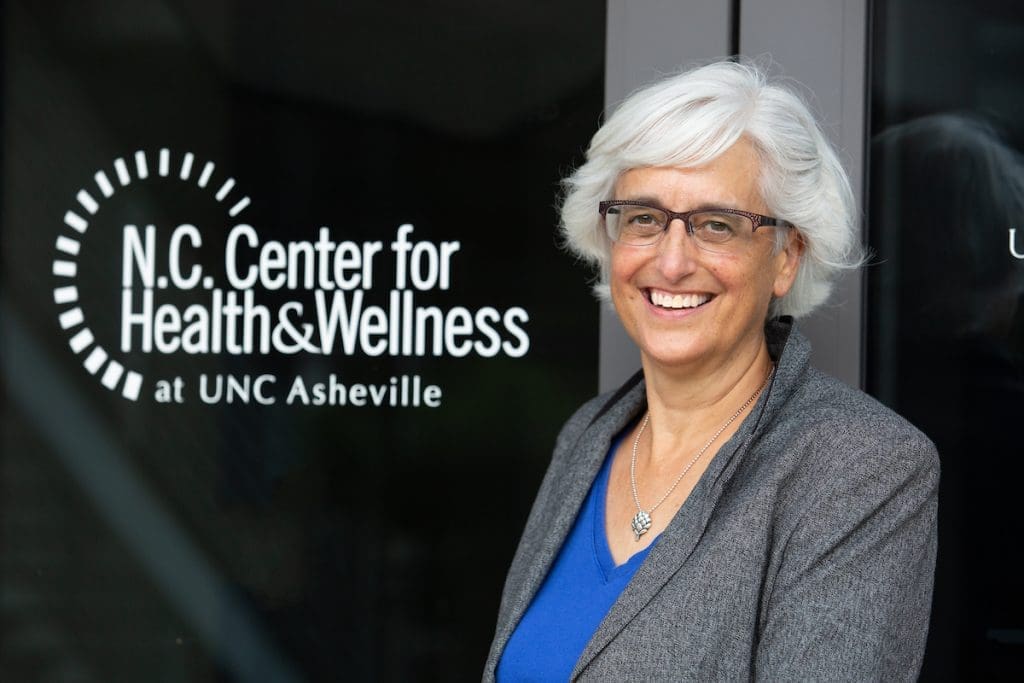
Amy Joy Lanou
UNC Asheville
Amy Joy Lanou is leading the charge for student health at UNC Asheville.
Lanou, a professor of health and wellness at UNC Asheville, helps coordinate the campus’s Student Health Ambassadors program. As part of that effort, students have worked throughout the academic year encouraging community expectations during COVID.
“This collaboration has supported a rapid and successful COVID-19 mitigation strategy with infection rates lower than regional or statewide ones while students continue living and learning on their campuses,” said Lanou, who is also the director of the North Carolina Center for Health and Wellness at UNC Asheville. “Student-driven peer education and support are the key to our success.”
That success is getting national attention.
UNC Asheville Student Health Ambassadors, in partnership with ambassador programs at five universities across Western North Carolina, have earned second place from the National Consortium for Building Healthy Academic Communities in a recent competition and will be recognized during a virtual summit April 21-22.
A spring 2021 grant from the Mountain Area Health Education Center pays for 20 Student Health Ambassadors at UNC Asheville. This semester, they have planned and implemented virtual panels, including one specific to vaccine questions; supported events such as the vaccine clinic and blood drives; completed 16 publications and 260 hours of training; delivered more than 200 meals to students in quarantine or isolation; and held over 600 support hours for the UNC Asheville campus community.
Rich Spontak, Reza Ghiladi, and Frank Scholle
NC State University
Imagine finding a way to inactivate SARS-CoV-2 — the virus that causes COVID-19.
One team of researchers at NC State University has done just that.
Rich Spontak, Frank Scholle and Reza Ghiladi are all faculty at NC State, working in the university’s Center for Advanced Virus Experimentation. They demonstrated that when substances called anionic polymers absorb water, protons can travel through nanoscale channels to the surface of the engineered material. This creates a highly acidic environment capable of inactivating viruses and killing bacteria and mold.
“If we want to coat high-contact surfaces such as textiles, countertops or walls, it’s possible,” says Scholle. “Virus inactivation will occur as long as there is sufficient humidity.”
Collaborators in the private sector are already in the process of evaluating applications for how some of these polymers might be used in a variety of settings.
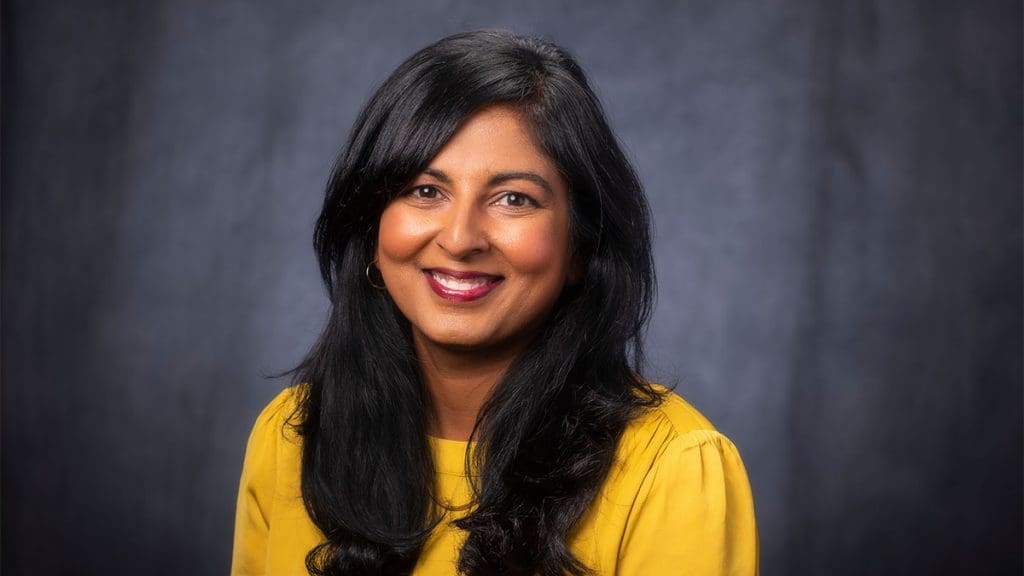
Viji Sathy
UNC-Chapel Hill
Viji Sathy, a professor at UNC-Chapel Hill, dove in last spring to help her fellow faculty members keep teaching after the coronavirus disrupted campus life. At the time, she said the emergency shift to remote instruction was akin to finding out that you have 30 minutes to cook dinner for 20 people.
Faculty not only had to adapt to using technology like Zoom, but also to giving their classes more structure than they would need in a traditional classroom. Sathy promoted Zoom breakout groups, discussion boards, real-time polling and other ways to build community and keep students engaged. She co-authored “8 Ways to Be More Inclusive in Your Zoom Teaching” with fellow faculty member Kelly Hogan for the Chronicle of Higher Education.
Fortunately, creating a more structured class is a change that not only improves online teaching but also makes learning more inclusive — a worthy goal, no matter what the setting. More structure works for most undergraduates, without harming those who don’t need it, says Sathy.
Sathy quickly moved beyond mere adaptation. She sees the pandemic as an opportunity to become better at teaching, even after the immediate crisis ends. While providing resources — gathering links to videos and articles, recording lectures, structuring discussions — takes time up front, it’s an efficient teaching method, Sathy says. Instructors will be able to use the recordings, study guides and discussion outlines created for online courses again and again, even when they return to a traditional classroom.
“Some of those structures that faculty will put into place, I suspect they’ll stay. They’ll find them helpful to students. And that’s a good thing,” Sathy said.
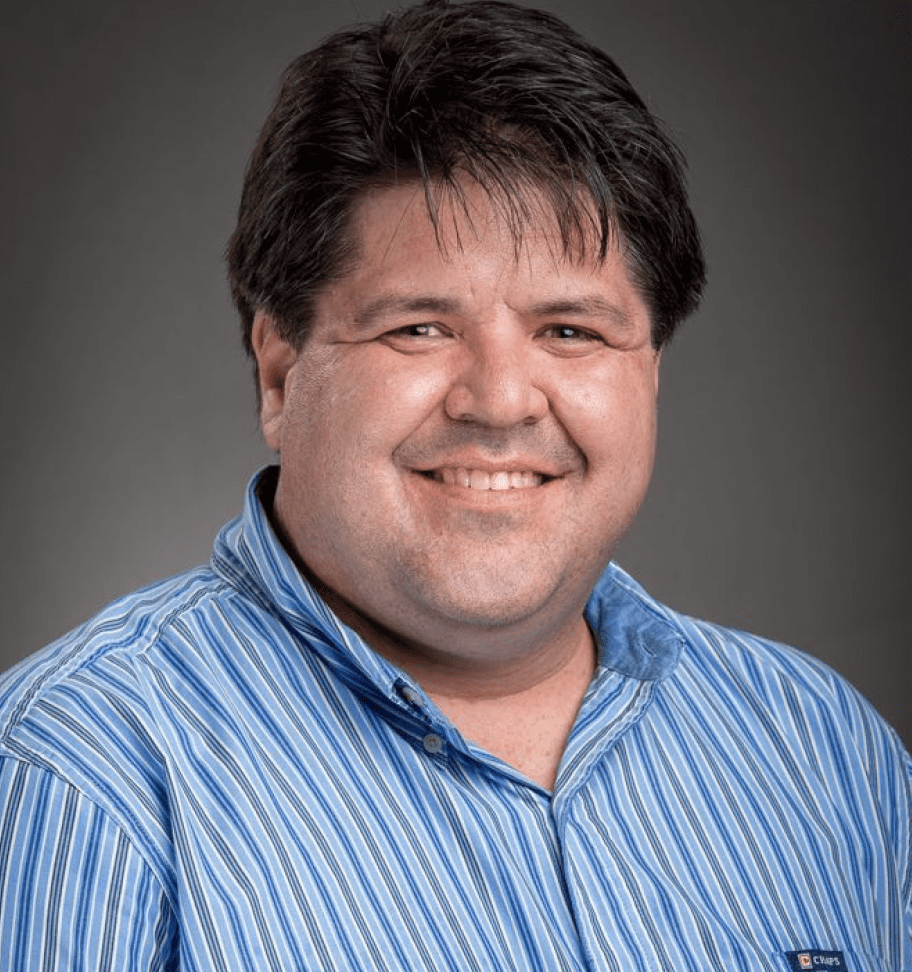
Nathan Wymer
North Carolina Central University
Nathan Wymer is committed to training North Carolina’s next generation of scientists.
A chemistry professor at North Carolina Central University, Wymer participates in research, teaching and service projects. He spends much of his time in the lab supervising his graduate and undergraduate students — or doing his own lab work. Wymer also runs a local program for high school students to intern in the lab.
“This time exposes them to the day-to-day life of a research chemist in the hope that they will be interested in a career in scientific research,” Wymer said.
“The UNC System has been a massive driver for economic growth for the state of North Carolina,” Wymer continued. “Strong university systems are why so many pharma and biotech companies exist in places like San Francisco, Boston, San Diego, Seattle, Philadelphia, and Research Triangle Park [RTP].”
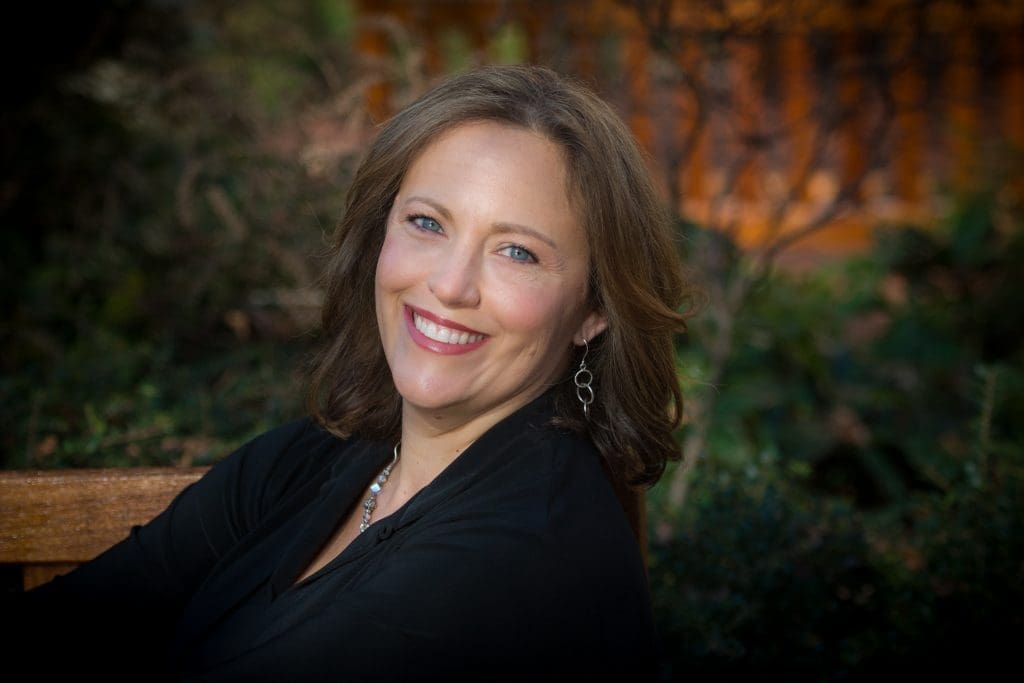
Rebecca MacLeod
UNC Greensboro
Rebecca MacLeod, a professor of music at the University of North Carolina at Greensboro, is a reminder that music lifts spirits and brings communities together — even in the middle of a global pandemic.
At UNC Greensboro, MacLeod uses music to unite communities and enhance the lives of her students, peers and the people of North Carolina. She directs the university’s Sinfonia Ensemble and works to develop music education programs that are more inclusive and open to broader audiences. MacLeod and her students work in the Lillian Rauch Beginning Strings Program, a creative community partnership that brings music experience to local students ages eight and up. She also coordinates two programs that provide string instruction to students from underserved populations.
MacLeod is a world leader in string education, and her textbook, “Strings in Today’s Classroom,” is becoming a standard in classroom music instruction. She has contributed dozens of essays and manuscripts that provide new perspectives and challenges to music and music education. Additionally, she has developed tools and methods that enable continual teaching and instruction during the recent pandemic crisis.

Lisa Geddie
Fayetteville State University
Lisa Geddie joined Fayetteville State University’s housekeeping unit in July 2017. She was promoted to team leader, and a short time after was selected as supervisor for FSU’s residence life housekeeping team.
Since December 2019, Geddie and her team have worked through staffing challenges related to COVID-19. They’ve also met high expectations for cleanliness and sanitation.
Geddie embraced the challenges of the pandemic and led her team through this difficult period with passion and empathy. She demanded excellence but managed to consistently exceed expectations and improve morale. She accomplished much in her first year as a supervisor, and FSU knows she has much more to contribute in the future.
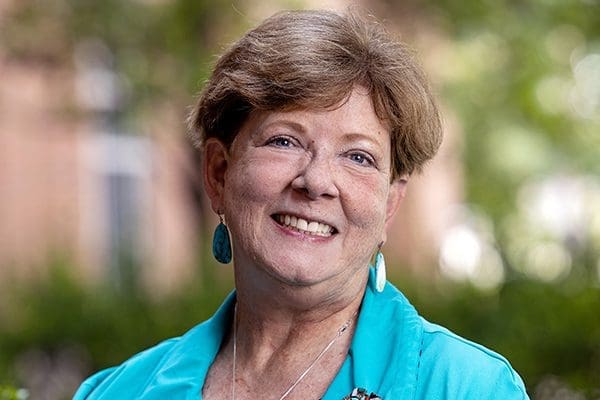
Anne Dickerson
East Carolina University
Anne Dickerson, a professor of occupational therapy at East Carolina University, wants to help older North Carolinians keep moving.
Transportation is important for baby boomers to think about, Dickerson says, because research shows people outlive their driving ability by six to 10 years.
“No one wants to just stay at home with no options because we cannot drive,” Dickerson said.
For people like Nancy Harris, a 75-year-old from eastern North Carolina, this reality has been underscored by the COVID-19 pandemic. Harris currently drives to get medicine and groceries, eat out with friends, or pick up her granddaughter from school. It was only after hearing a presentation from Dickerson that the senior began looking ahead, planning for a time when she might be unable to get behind the wheel.
“There’s a big difference between choosing to spend a lazy day at home and having to stay home,” Harris said.
That’s why Dickerson is so passionate about reaching Harris, and others like her. As part of her work at ECU, Dickerson presents to retired groups and communities, helping them plan for the future.
For some, planning involves discussions about ridesharing with friends, family, church members, or caretakers at senior centers. Public transportation and services like Uber or Lyft also provide options.
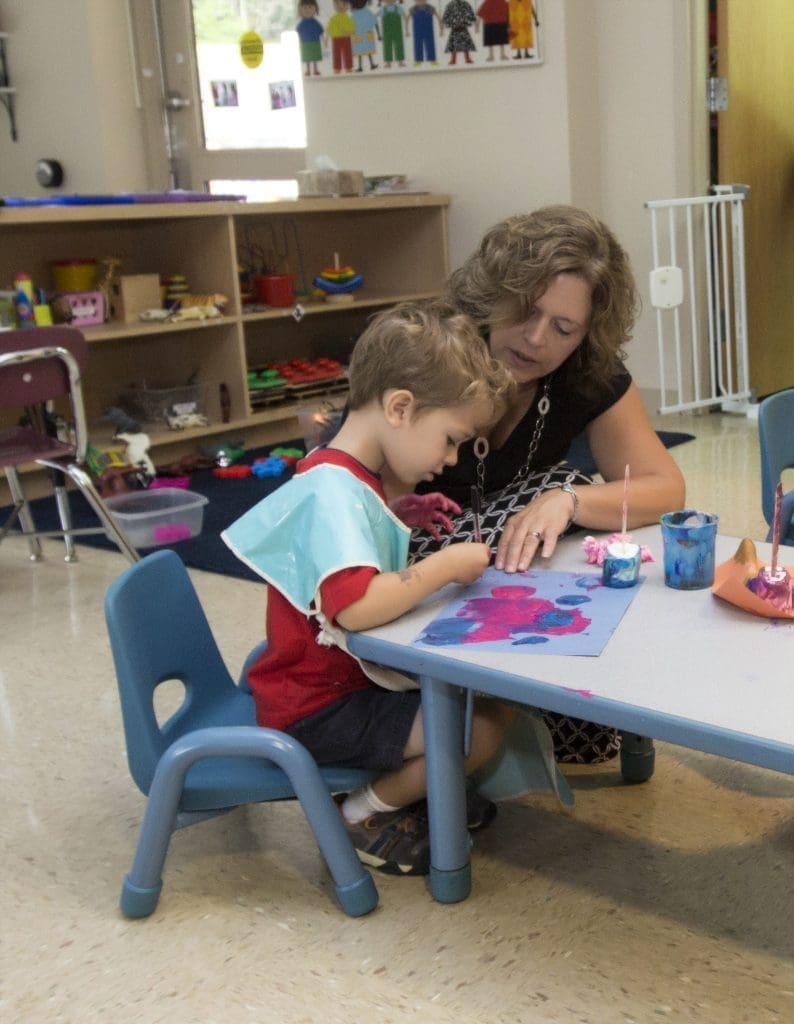
Sherry Street-Tobin and Karalee Cole
Appalachian State University
Two speech pathologists at Appalachian State University recently gave a local mom a priceless gift. They helped her three-year-old son say “mama.”
A three-year-old child diagnosed with severe childhood apraxia of speech is learning to say his first words due to the hard work of speech-language pathologists Sherry Street-Tobin and Karalee Cole. Street-Tobin and Cole work in Appalachian’s Communication Disorders Clinic, providing their young client with telehealth services during the pandemic.
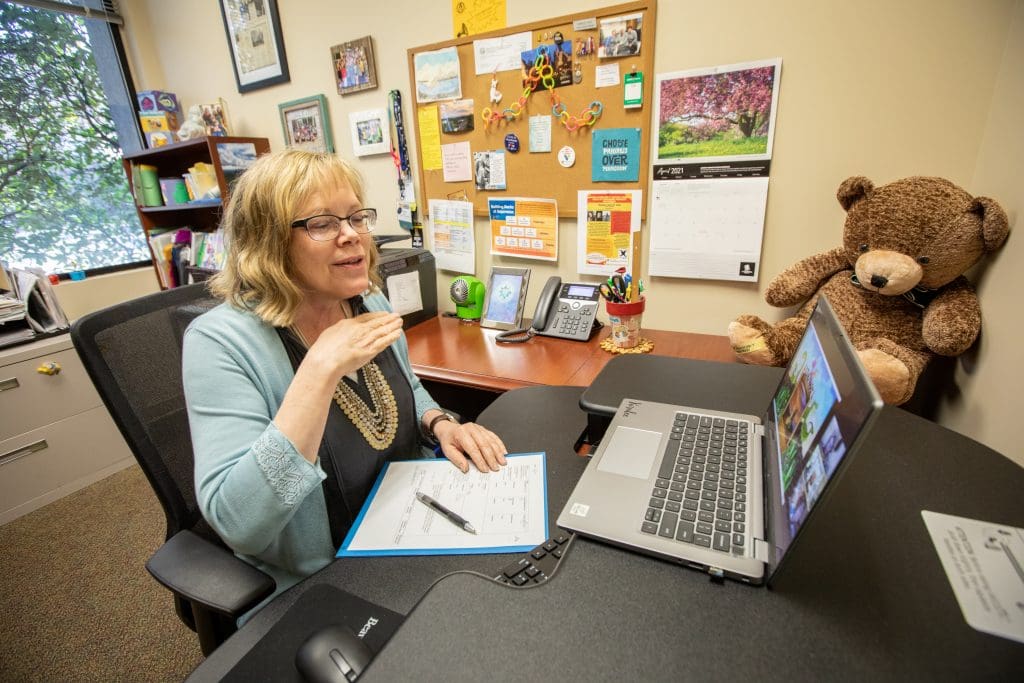
The clinic is able to offer services to children regardless of their family’s financial situation, said Street-Tobin, who directs the clinic’s Thomas O. Eller Preschool Language Classroom. Street-Tobin has worked with the child since January 2020.
“Until very recently, he didn’t have a word to call his mom. After much therapy and home practice with mom, he learned to say ‘mama,’ which brought his mother such joy during this time of stress, and the child now says it so well.”
Through PLC, the child receives intensive speech therapy, which comprises group therapy and individual therapy sessions delivered over a two-day period.
